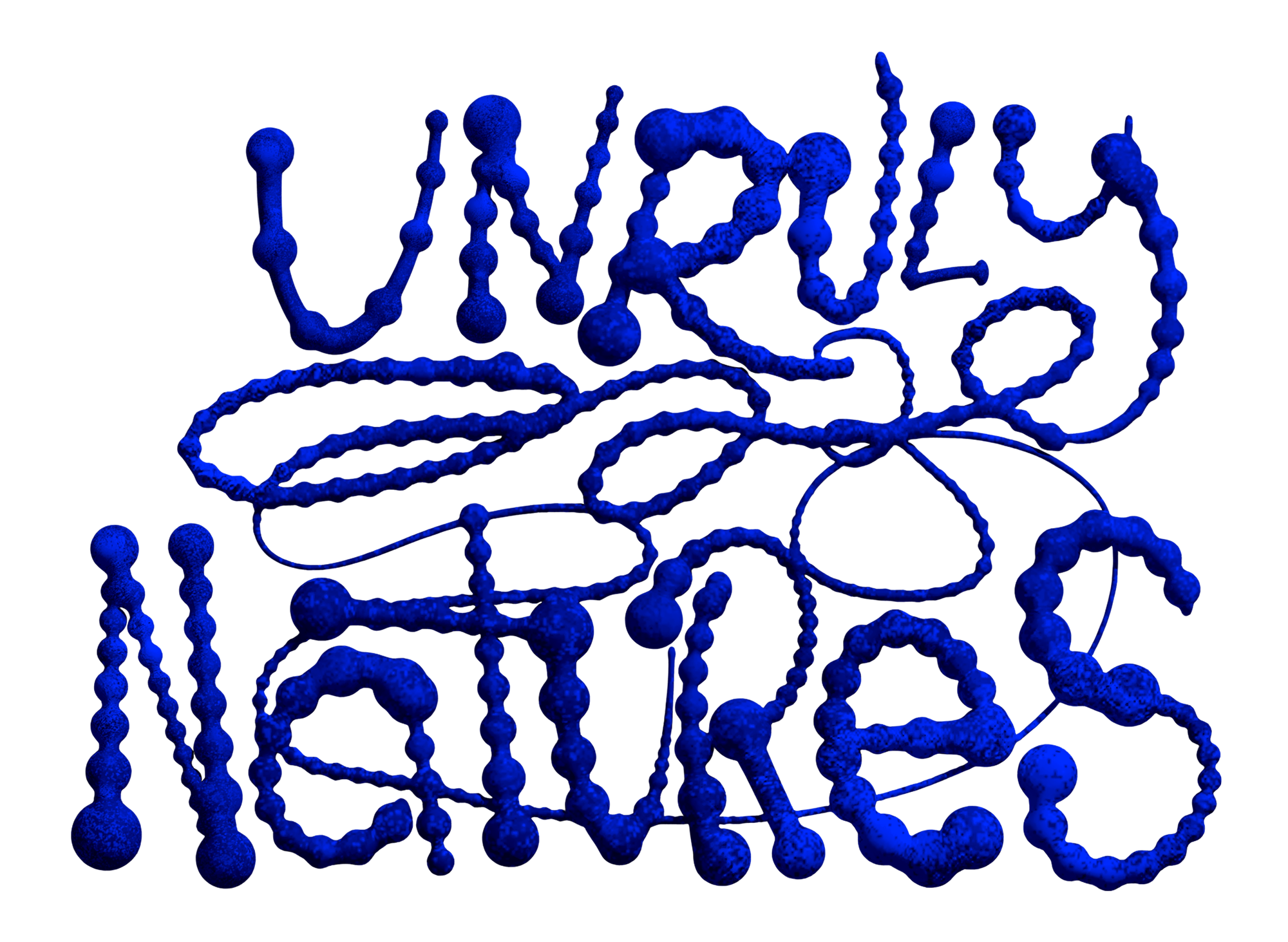
Translating Nature
10 Jul – 13 Jul 2025
Curated by Ptyx Studio
Projectspace 38/40,
Zesde Vogelstraat 38
1022 XE Amsterdam
Translating Nature is a group exhibition that explores the relationship between nature and language. Offshore (Isabel Seiffert & Christoph Miler) will exhibit parts of their project The Myth of Memory—the second chapter in their long-term research about the return of wolves. In their work, they address the role of the predator within cultural narratives and collective memory-making through experimental poetry, mashup symbolism and stone engravings.
10 Jul – 13 Jul 2025
Curated by Ptyx Studio
Projectspace 38/40,
Zesde Vogelstraat 38
1022 XE Amsterdam
Translating Nature
Translating Nature is a group exhibition that explores the relationship between nature and language. Offshore (Isabel Seiffert & Christoph Miler) will exhibit parts of their project The Myth of Memory—the second chapter in their long-term research about the return of wolves. In their work, they address the role of the predator within cultural narratives and collective memory-making through experimental poetry, mashup symbolism and stone engravings.

July 3–27, 2025
Rotterdam
A transdisciplinary festival exploring how waste shapes our environments, imaginaries, and urban futures. Full programme and sign-up links here
Wasteland Festival is taking place across four sites in Rotterdam, the programme brings together artists, researchers and communities to examine the afterlives of discarded matter and the hidden infrastructures of the city — from logistics and landfills to recycling systems and polluted ecologies.
Sigrid Schmeisser will contribute to the festival through an artistic field trip to Hoge Bergse Bos, a former landfill on Rotterdam's periphery, on Sunday July 20 as part of the project 'Shifting Mountains', and with the exhibit 'Nearing Away' at TENT from July 18–26.
Rotterdam
A transdisciplinary festival exploring how waste shapes our environments, imaginaries, and urban futures. Full programme and sign-up links here
Wasteland Festival 2025
Wasteland Festival is taking place across four sites in Rotterdam, the programme brings together artists, researchers and communities to examine the afterlives of discarded matter and the hidden infrastructures of the city — from logistics and landfills to recycling systems and polluted ecologies.
Sigrid Schmeisser will contribute to the festival through an artistic field trip to Hoge Bergse Bos, a former landfill on Rotterdam's periphery, on Sunday July 20 as part of the project 'Shifting Mountains', and with the exhibit 'Nearing Away' at TENT from July 18–26.

July 1-2, 2025
University of Lausanne
International Symposium organized by the Institut de géographie et durabilité, Faculté des géosciences et de l'environnement. More information here
The world today is in crisis. Health and economic crises, crises of information, social crises, (geo)political crises. These crises even verge on a tipping point when it comes to climate change, biodiversity, or major biogeophysical cycles. But more fundamentally, beneath these current crises lies a crisis of sensitivity.
Since the end of World War II, knowledge from scientific ecology, geology, biology, Earth System science, climatology, and other fields has progressed tremendously. Today, it informs us—likely a never before—about the environmental situation humanity faces and the challenges it must confront to maintain Earth’s habitability. And yet, despite this unambiguous reality and despite myriad of minority alternatives at all levels, it seems that neither individual behaviors, nor state policies, nor the international community is able—or willing—to make the essential efforts required to respond to the ecological degradation of living conditions.
In this context, the project of a first-person ecology finds unique relevance today, and promoting its practice has become urgent. For over forty years, initiatives in various fields—from ecological though (such as deep ecology) to psychology (like ecopsychology) and philosophy (such as ecophenomenology)—have emerged to rehabilitate the lived experience of nature.
This conference thus aims to explore, across various fields and in an interdisciplinary manner, the contribution that a first-person ecology can offer in renewing our physical and sensitive bonds to nature. It seeks to foster a more ecological worldview and mindset, along with the motivation needed for more responsible practices that are now compatible with planetary boundaries.
University of Lausanne
International Symposium organized by the Institut de géographie et durabilité, Faculté des géosciences et de l'environnement. More information here
First-Person Ecology – Interdisciplinary Insights, Theoretical Challenges, and Practical Implications
The world today is in crisis. Health and economic crises, crises of information, social crises, (geo)political crises. These crises even verge on a tipping point when it comes to climate change, biodiversity, or major biogeophysical cycles. But more fundamentally, beneath these current crises lies a crisis of sensitivity.
Since the end of World War II, knowledge from scientific ecology, geology, biology, Earth System science, climatology, and other fields has progressed tremendously. Today, it informs us—likely a never before—about the environmental situation humanity faces and the challenges it must confront to maintain Earth’s habitability. And yet, despite this unambiguous reality and despite myriad of minority alternatives at all levels, it seems that neither individual behaviors, nor state policies, nor the international community is able—or willing—to make the essential efforts required to respond to the ecological degradation of living conditions.
In this context, the project of a first-person ecology finds unique relevance today, and promoting its practice has become urgent. For over forty years, initiatives in various fields—from ecological though (such as deep ecology) to psychology (like ecopsychology) and philosophy (such as ecophenomenology)—have emerged to rehabilitate the lived experience of nature.
This conference thus aims to explore, across various fields and in an interdisciplinary manner, the contribution that a first-person ecology can offer in renewing our physical and sensitive bonds to nature. It seeks to foster a more ecological worldview and mindset, along with the motivation needed for more responsible practices that are now compatible with planetary boundaries.

June 26, 2025
Campus de la Ciutadella, Barcelona
More information here
International Workshop organized by Gregorio Tenti and Alice Iacobone.
Speakers: Amanda Betzkes, Antonino Firenze, Alice Iacobone, Justas Patkanskas, Anda Pleniceanu, Guillermo Rodriguez Alonso, Santiago Zabala.
Campus de la Ciutadella, Barcelona
More information here
Hermeneutics of Extinction
International Workshop organized by Gregorio Tenti and Alice Iacobone.
Speakers: Amanda Betzkes, Antonino Firenze, Alice Iacobone, Justas Patkanskas, Anda Pleniceanu, Guillermo Rodriguez Alonso, Santiago Zabala.

June 12, 2025
Campus de la Ciutadella, Barcelona
More information here
International Workshop organized by Gregorio Tenti and Alice Iacobone.
Speakers: Clara Benito, Emanuele Braga, Chiara Caiazzo, Raul Ciannella, Federico Luisetti, Maria Antònia Marti Escayol, Lucia Rebolino, Giovanbattista Tusa. Discussants: Paolo Furia, Anda Pleniceanu.
Campus de la Ciutadella, Barcelona
More information here
Nature Out of Joint – Planetarities, Cosmopolitics and Radical Futurity
International Workshop organized by Gregorio Tenti and Alice Iacobone.
Speakers: Clara Benito, Emanuele Braga, Chiara Caiazzo, Raul Ciannella, Federico Luisetti, Maria Antònia Marti Escayol, Lucia Rebolino, Giovanbattista Tusa. Discussants: Paolo Furia, Anda Pleniceanu.

May 2025
Olten, Switzerland
More information here
Splicer is a photographic apparatus that challenges conventional camera design. Developed by Florian Amoser using a line scan sensor sourced from industrial surplus, it functions as a multi-axial visual sampler. While grounded in traditional lens-based imaging, Splicer produces images that are not direct representations of the physical world but rather spatial and temporal condensations offering a granular perspective on the physical world.
Alongside the open-sourcing of the apparatus, a continuous series of collaborative Conversations position Splicer not simply as a photographic device, but as a shared and situated platform for image-making, reflection, and critique. They open space for rethinking authorship, attention, and the material conditions under which images are made. This practice emerges from sustained reflection on Splicer's own situatedness within the visual regime it interrogates.
In May 2025, Rony Emmenegger joined Splicer to talk about the deep geological storage of radioactive waste in Switzerland, an area where time, politics, science, and landscape intersect in complex ways.
Olten, Switzerland
More information here
Splicer Conversations N°3 with Rony Emmenegger
Splicer is a photographic apparatus that challenges conventional camera design. Developed by Florian Amoser using a line scan sensor sourced from industrial surplus, it functions as a multi-axial visual sampler. While grounded in traditional lens-based imaging, Splicer produces images that are not direct representations of the physical world but rather spatial and temporal condensations offering a granular perspective on the physical world.
Alongside the open-sourcing of the apparatus, a continuous series of collaborative Conversations position Splicer not simply as a photographic device, but as a shared and situated platform for image-making, reflection, and critique. They open space for rethinking authorship, attention, and the material conditions under which images are made. This practice emerges from sustained reflection on Splicer's own situatedness within the visual regime it interrogates.
In May 2025, Rony Emmenegger joined Splicer to talk about the deep geological storage of radioactive waste in Switzerland, an area where time, politics, science, and landscape intersect in complex ways.

May 8-10, 2025
La Chimba, Ecuador
The daytime activities will be broadcast live on the Internet, with simultaneous translation between English and Spanish on Friday. More information and registration here
The international Soil Assembly network was born in 2022 to bring together humans from many fields and territories with plants, microbes, fungi, algae, seeds, and other practitioners in the web of life, to share stories and practices of biodiversity, soil regeneration and planetary care.
A Soil Assembly is an actor of the territory where it is organised. The Soil Assembly #2 : Tinku Uku Pacha takes place in La Chimba, Ecuador, a rural indigenous community in the Andes, home to the great peasant leader Tránsito Amaguaña who, along with many others, fought for indigenous peoples’ rights and access to land.
On May 9, a wide variety of voices and visions, countries and continents will be brought together, to share views on soil and planetary peasantry, in an international assembly dedicated to the science, art and politics of soil. Leading international and local thinkers, leaders, peasants and artists, contribute to the debate during the day.
Thursday 8 May 2025: REGENERATIVE RURAL ECONOMIES
Friday 9 May 2025: ART, SCIENCE & PLANETARY PEASANTRY
Saturday 10 May 2025: CEREMONY AND CELEBRATION FOR TRANSIT AMAGUAÑA
La Chimba, Ecuador
The daytime activities will be broadcast live on the Internet, with simultaneous translation between English and Spanish on Friday. More information and registration here
International Soil Assembly II
The international Soil Assembly network was born in 2022 to bring together humans from many fields and territories with plants, microbes, fungi, algae, seeds, and other practitioners in the web of life, to share stories and practices of biodiversity, soil regeneration and planetary care.
A Soil Assembly is an actor of the territory where it is organised. The Soil Assembly #2 : Tinku Uku Pacha takes place in La Chimba, Ecuador, a rural indigenous community in the Andes, home to the great peasant leader Tránsito Amaguaña who, along with many others, fought for indigenous peoples’ rights and access to land.
On May 9, a wide variety of voices and visions, countries and continents will be brought together, to share views on soil and planetary peasantry, in an international assembly dedicated to the science, art and politics of soil. Leading international and local thinkers, leaders, peasants and artists, contribute to the debate during the day.
Thursday 8 May 2025: REGENERATIVE RURAL ECONOMIES
Friday 9 May 2025: ART, SCIENCE & PLANETARY PEASANTRY
Saturday 10 May 2025: CEREMONY AND CELEBRATION FOR TRANSIT AMAGUAÑA

May 2-3, 2025
Porteous, Geneva
More information and registration here
Hydromondes
Utopiana and the Fondation Zoein, in partnership with the Office cantonal de l'eau de Genève (OCEau), invite to the event designed and produced by the Hydromondes collective as part of their residency project ‘Towards a bioregional diagnosis of the Rhône watershed (Greater Geneva)’. The event will be attended by a number of groups, and will be followed by a musical aperitif.
Porteous, Geneva
More information and registration here
Hydromondes
– Research Presentation
Utopiana and the Fondation Zoein, in partnership with the Office cantonal de l'eau de Genève (OCEau), invite to the event designed and produced by the Hydromondes collective as part of their residency project ‘Towards a bioregional diagnosis of the Rhône watershed (Greater Geneva)’. The event will be attended by a number of groups, and will be followed by a musical aperitif.

April 24, 2025
University of St. Gallen
The SQUARE
With Roberto Esposito, Enrica Lisciani Petrini, Dario Gentili, Elettra Stimilli, Maurizio Meloni, Sophie Gosselin, Filippo Barbera
More information here
The conference brings together leading Italian scholars to explore how recent advances in biopolitics, political ecology, sociology, and biology are transforming the understanding of institutions. Presentations will be in Italian - expect for the talk by Maurizio Meloni. No registration needed.
University of St. Gallen
The SQUARE
With Roberto Esposito, Enrica Lisciani Petrini, Dario Gentili, Elettra Stimilli, Maurizio Meloni, Sophie Gosselin, Filippo Barbera
More information here
Istituire la Vita
The conference brings together leading Italian scholars to explore how recent advances in biopolitics, political ecology, sociology, and biology are transforming the understanding of institutions. Presentations will be in Italian - expect for the talk by Maurizio Meloni. No registration needed.

March 27-28, 2025
Inst Història de la Ciència RECERCA
Universitat Autònoma de Barcelona
08193, Bellaterra, Barcelona
With Samuele Andreoni, Marco Armiero, Margherita D’Andrea, Simone Ferrari, Elisa Fornalé, Elisabetta Lambiase, Stephen Lee, Federico Luisetti, Sandra Manto, Rachel Pain, Giusy Pappalardo, Angela Pietrafesa, Roberto Sciarelli, Carlos Tabernero, Salvo Torre. More information here
This two-day event, organized by the University of Bern SNSF SPARK Project Climate Justice and co-hosted by the Institut d’Història de la Ciència, brings together leading scholars to explore the intersections of environmental violence, human rights, migration, and resistance. Featuring insightful discussions, a book launch, and a film screening, Breaking Times offers a unique space for academics, activists, and policymakers to engage with pressing global challenges.
Inst Història de la Ciència RECERCA
Universitat Autònoma de Barcelona
08193, Bellaterra, Barcelona
With Samuele Andreoni, Marco Armiero, Margherita D’Andrea, Simone Ferrari, Elisa Fornalé, Elisabetta Lambiase, Stephen Lee, Federico Luisetti, Sandra Manto, Rachel Pain, Giusy Pappalardo, Angela Pietrafesa, Roberto Sciarelli, Carlos Tabernero, Salvo Torre. More information here
Breaking Times – Slow Violence, Resistance, Prefigurative Politics
This two-day event, organized by the University of Bern SNSF SPARK Project Climate Justice and co-hosted by the Institut d’Història de la Ciència, brings together leading scholars to explore the intersections of environmental violence, human rights, migration, and resistance. Featuring insightful discussions, a book launch, and a film screening, Breaking Times offers a unique space for academics, activists, and policymakers to engage with pressing global challenges.
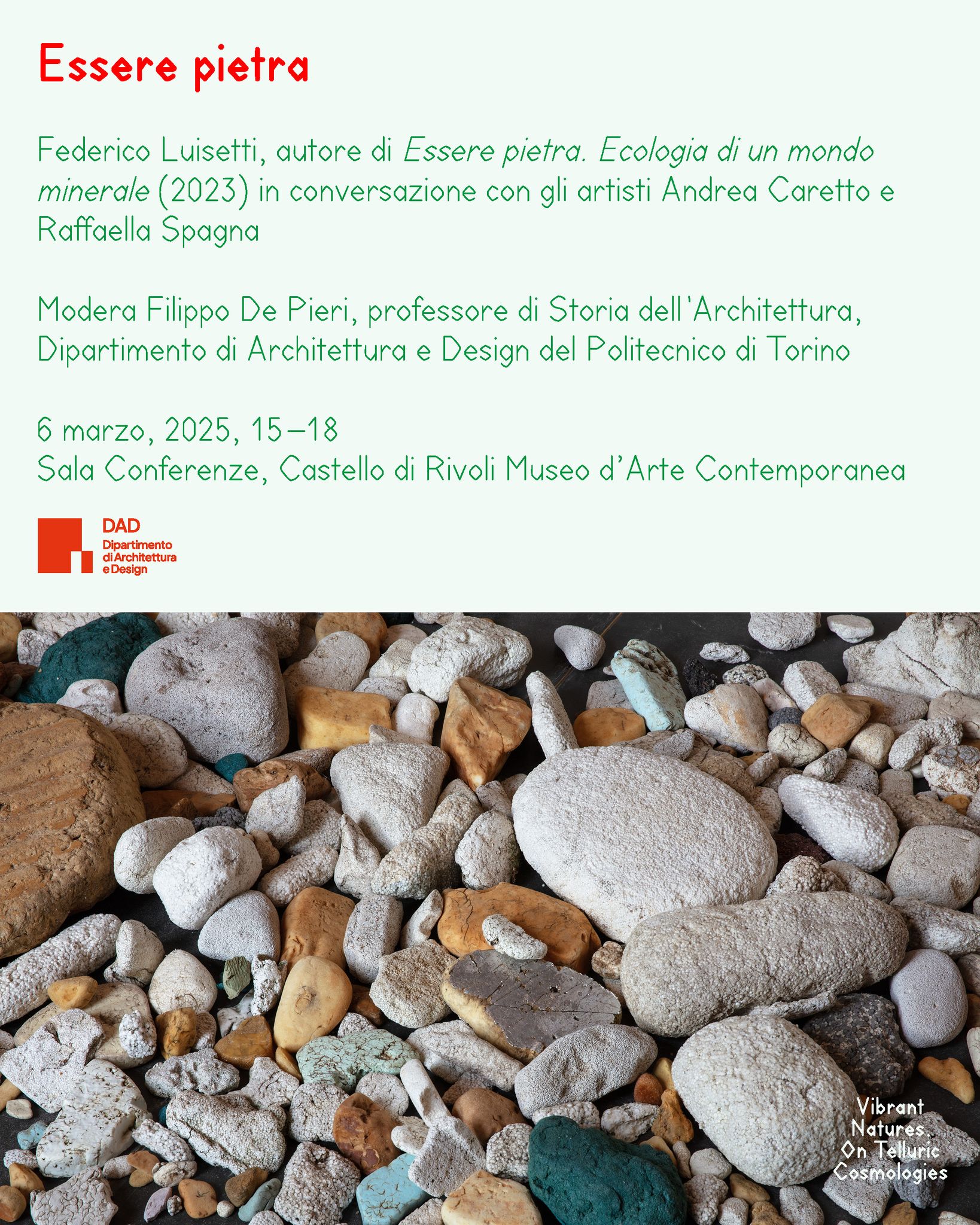
March 6, 2025
3-8 pm
Sala Conferenze, Edificio Manica Lunga
Piazza Mafalda di Savoia
10098 Rivoli - Torino
With Andrea Carretto, Raffaella Spagna, Federico Luisetti. More information here
Federico Luisetti, author of the book Essere pietra. Ecology of a Mineral World (2023), in conversation with the artists Andrea Caretto and Raffaella Spagna. Moderator: Filippo De Pieri, Professor of History of Architecture at the Department of Architecture and Design of the Politecnico di Torino. Introduced by Marianna Vecellio, curator of the Museum.
The event will be followed by a round table with the students of the PhD course Architecture. History and Design of the Department of Architecture and Design of the Politecnico di Torino.
3-8 pm
Sala Conferenze, Edificio Manica Lunga
Piazza Mafalda di Savoia
10098 Rivoli - Torino
With Andrea Carretto, Raffaella Spagna, Federico Luisetti. More information here
Essere pietra | Vibrant Natures – On Telluric Cosmologies
Federico Luisetti, author of the book Essere pietra. Ecology of a Mineral World (2023), in conversation with the artists Andrea Caretto and Raffaella Spagna. Moderator: Filippo De Pieri, Professor of History of Architecture at the Department of Architecture and Design of the Politecnico di Torino. Introduced by Marianna Vecellio, curator of the Museum.
The event will be followed by a round table with the students of the PhD course Architecture. History and Design of the Department of Architecture and Design of the Politecnico di Torino.

February 25, 2025
4:15 pm
Hybrid Event
Guest lecture with Tao Leigh Goffe at the University of St. Gallen. Registration here
Tao Leigh Goffe will discuss her recently published book, Dark Laboratory: On Columbus, the Caribbean, and the Origins of the Climate Crisis (Doubleday 2025). Using the Caribbean as a case study, Dark Laboratory traces the vibrant and complex history of the islands back to 1492 and the arrival of Christopher Columbus, when the Caribbean became subject of Western exploitation.
Tao Leigh Goffe is an associate professor of literary theory and cultural history with a focus on the environmental humanities and geology. She joined the Department of Africana, Puerto Rican and Latino Studies at Hunter College, City University of New York after over a decade of research and teaching on Black feminist engagements with Indigeneity and Asian diasporic racial formations. This work is the basis of the Dark Laboratory, which she founded and leads. Established for the study of Black and Indigenous ecologies, Dark Lab is housed at Hunter College and has been supported by the New Museum’s incubator for art and technology.
4:15 pm
Hybrid Event
Guest lecture with Tao Leigh Goffe at the University of St. Gallen. Registration here
Dark Laboratory
Tao Leigh Goffe will discuss her recently published book, Dark Laboratory: On Columbus, the Caribbean, and the Origins of the Climate Crisis (Doubleday 2025). Using the Caribbean as a case study, Dark Laboratory traces the vibrant and complex history of the islands back to 1492 and the arrival of Christopher Columbus, when the Caribbean became subject of Western exploitation.
Tao Leigh Goffe is an associate professor of literary theory and cultural history with a focus on the environmental humanities and geology. She joined the Department of Africana, Puerto Rican and Latino Studies at Hunter College, City University of New York after over a decade of research and teaching on Black feminist engagements with Indigeneity and Asian diasporic racial formations. This work is the basis of the Dark Laboratory, which she founded and leads. Established for the study of Black and Indigenous ecologies, Dark Lab is housed at Hunter College and has been supported by the New Museum’s incubator for art and technology.
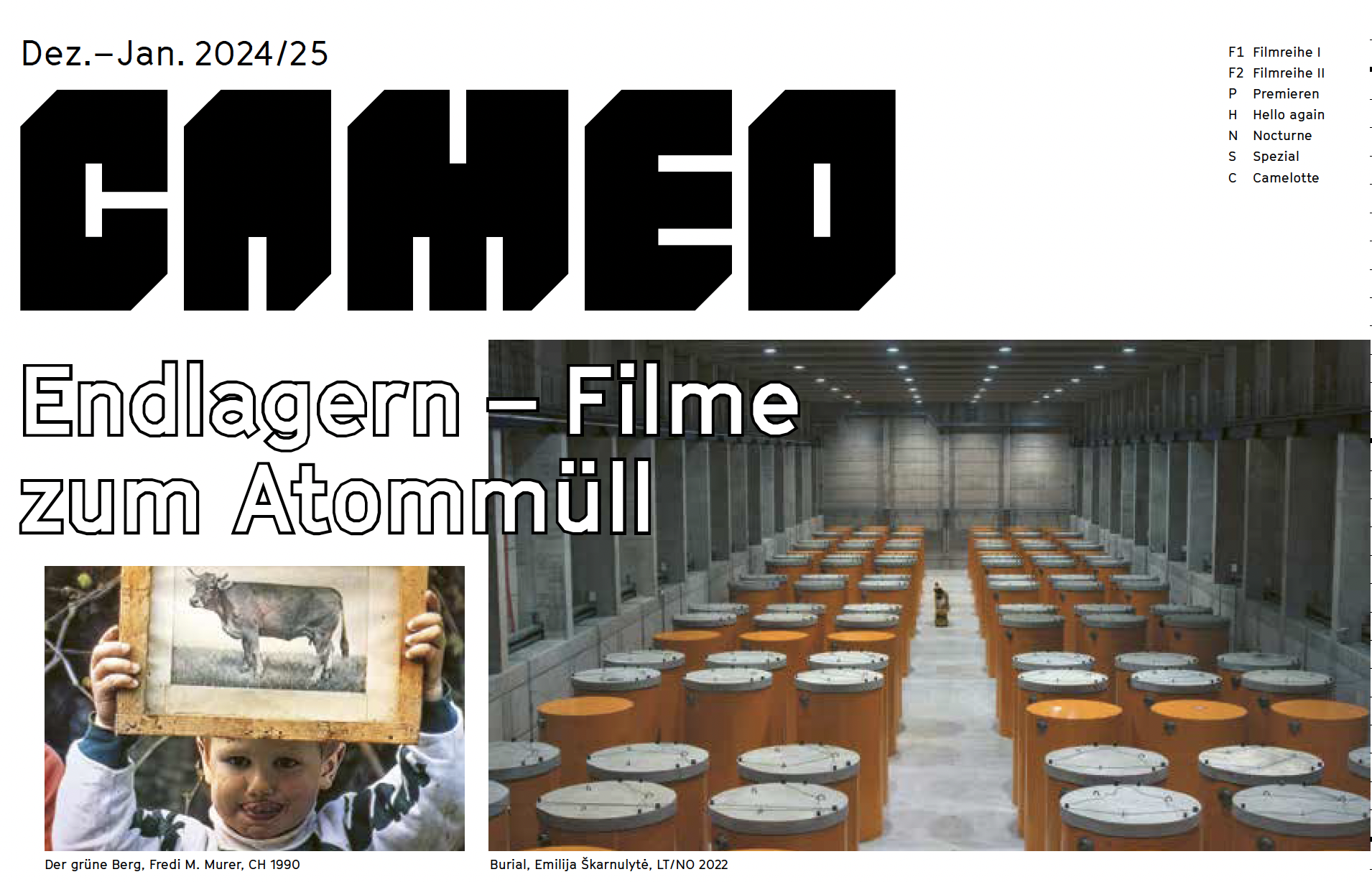
December 2024 / January 2025
Film Series on Nuclear Waste at Kino Cameo, Winterthur, Switzerland.
More information here
"Geology has spoken!" announced the Swiss National Co-operative for the Disposal of Radioactive Waste (Nagra) in 2022, claiming that the site north of Lägern was suitable for the safe containment of waste for the next million years. Despite this optimism, nuclear waste disposal remains a challenge for science and technology, for society and democracy - and therefore relevant material for the art of film. The Cameo film series offers a journey through the nuclear past, present and future, providing fascinating insights into the environmental, social and political challenges of dealing with radioactive waste. At the same time, it folds deep into time and space, allowing a more speculative approach to the invisible underground and the unknown in the distant future.
Film Series on Nuclear Waste at Kino Cameo, Winterthur, Switzerland.
More information here
Endlagern – Filme zum Atommüll
"Geology has spoken!" announced the Swiss National Co-operative for the Disposal of Radioactive Waste (Nagra) in 2022, claiming that the site north of Lägern was suitable for the safe containment of waste for the next million years. Despite this optimism, nuclear waste disposal remains a challenge for science and technology, for society and democracy - and therefore relevant material for the art of film. The Cameo film series offers a journey through the nuclear past, present and future, providing fascinating insights into the environmental, social and political challenges of dealing with radioactive waste. At the same time, it folds deep into time and space, allowing a more speculative approach to the invisible underground and the unknown in the distant future.
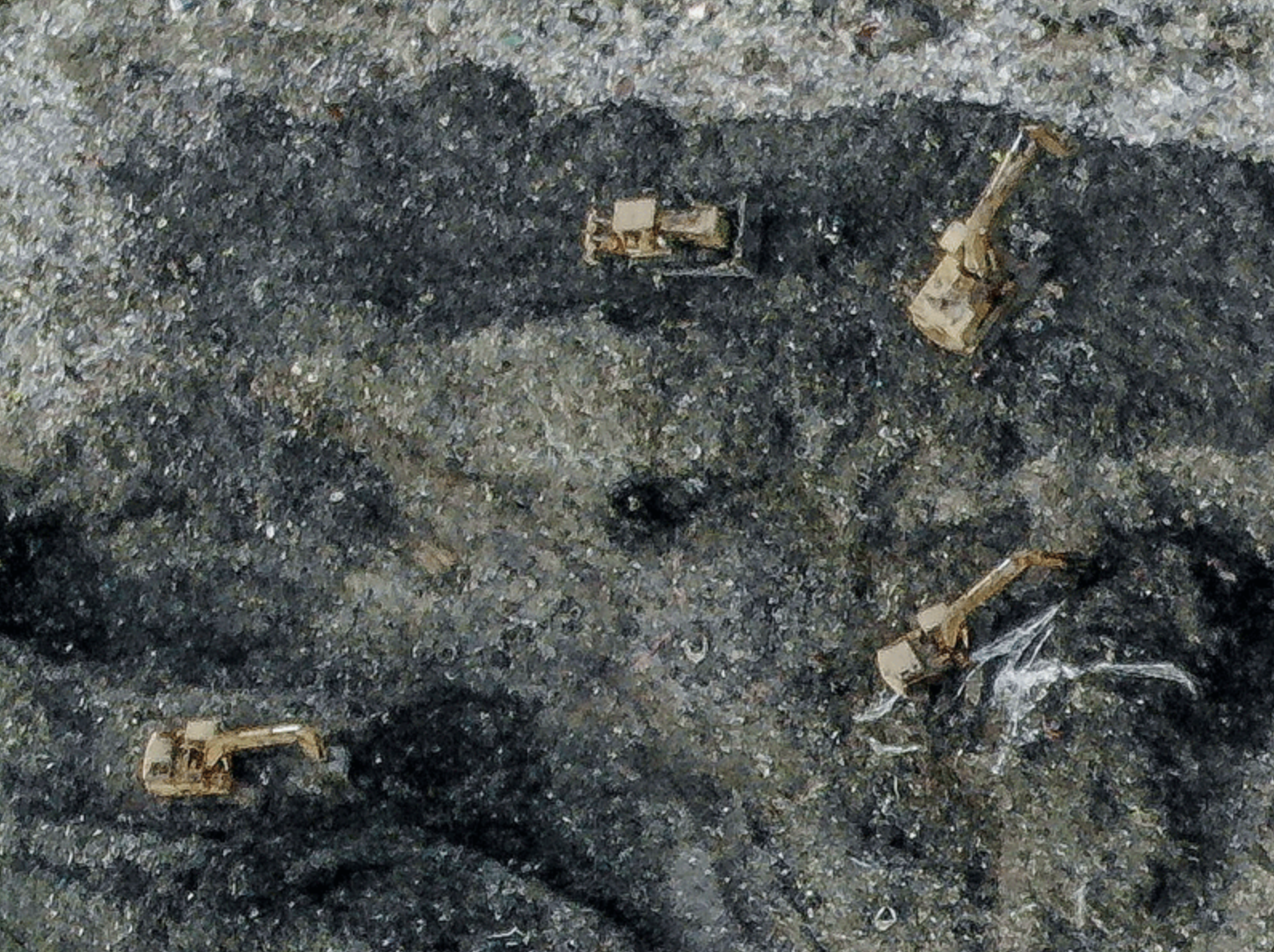
December 6 - 8, 2024
Event Series
Diaphanes Space, Berlin
Panel discussions, Films, Performances Readings.
More Information here
What are the fundaments from which we can develop new perspectives in the face of permanent crisis, failed deadlines that we allow to pass before our very eyes, the critical points that are already behind us? How can we imagine and represent differently, what creative means are available in the deep shadow of catastrophe? What can we build on, trapped between historical chasms and anxiety about the future?
On Wasted Grounds is an ongoing transdisciplinary research and exhibition project that consistently transcends topological and disciplinary boundaries, interweaving scientific and fictional narratives, interventions from art and research, architectural and technological visions, critical essays and speculative image series. This magazine in progress forms a global arrangement of locally gained perspectives; in its nine chapters, the most diverse experiences and positions are juxtaposed between divergent semantic poles.
with Aàdesokan, Ixmukané Aguilar, Ghayath Almadhoun, Mieke Bal, Stephen Barber, Priya Basil, Nikita Dhawan, Ibou Diop, Alexander García Düttmann, Logan February, Christian Filips, Liliana Gómez, Julian Hetzel, Inkasso, Sandra Jasper, Eckardt Lindner, Federico Luisetti, Tom McCarthy, Mark Mushiva, Silvia Noronha, I.V. Nuss, Kinga Ötvös, Lucas Pohl, Dorota Sajewska, Jacob Stoy, Daniel Tyradellis, Ines Weizman, Arkadi Zaides and others.
Curated by Marie Glassl
Event Series
Diaphanes Space, Berlin
Panel discussions, Films, Performances Readings.
More Information here
On Wasted Grounds
What are the fundaments from which we can develop new perspectives in the face of permanent crisis, failed deadlines that we allow to pass before our very eyes, the critical points that are already behind us? How can we imagine and represent differently, what creative means are available in the deep shadow of catastrophe? What can we build on, trapped between historical chasms and anxiety about the future?
On Wasted Grounds is an ongoing transdisciplinary research and exhibition project that consistently transcends topological and disciplinary boundaries, interweaving scientific and fictional narratives, interventions from art and research, architectural and technological visions, critical essays and speculative image series. This magazine in progress forms a global arrangement of locally gained perspectives; in its nine chapters, the most diverse experiences and positions are juxtaposed between divergent semantic poles.
with Aàdesokan, Ixmukané Aguilar, Ghayath Almadhoun, Mieke Bal, Stephen Barber, Priya Basil, Nikita Dhawan, Ibou Diop, Alexander García Düttmann, Logan February, Christian Filips, Liliana Gómez, Julian Hetzel, Inkasso, Sandra Jasper, Eckardt Lindner, Federico Luisetti, Tom McCarthy, Mark Mushiva, Silvia Noronha, I.V. Nuss, Kinga Ötvös, Lucas Pohl, Dorota Sajewska, Jacob Stoy, Daniel Tyradellis, Ines Weizman, Arkadi Zaides and others.
Curated by Marie Glassl

November 26, 2024
10:15 am
Online Event
Guest lecture with Lisa Blackmore at the University of St. Gallen. Registration here
Crouching on the banks of the Bogotá River, after its serpentine path through Colombia's capital city's urban sprawl, the smell is overpowering. Islands of white foam sail by on a stream of black water, which navigates car tires, clothes and plastic containers, tangled layers of waste sedimented over time, making the riverbanks an archive of modern life. Water is never just water, but liquid ecologies that connect turbulent histories of "capital flows, philosophical currents, aesthetic traditions and residual traumas that connect distinct spaces, times and bodies” (Blackmore & Gómez).
In watersheds, collective life is expressed in the unfolding negotiation of "metabolic-ecological processes" (Swyngedouw) that produce affect ecosystem integrity and public health. The transformation of rivers into infrastructures for agriculture, industry and urbanization engenders forms of hydrosocial metabolism where bodies, lives and world-making forces interpermeate in sometimes nourishing but also potentially unjust and toxic ways. Amid intense anthropic transformation, the fluctuating health and contamination of bodies of water are material expressions of the cultural, socioeconomic, and political forces conditioning the reproduction of life, a phenomenon that is heightened in contaminated environments where these forces can diminish the well-being of human and non-human bodies of water.
In this talk, I address these questions through the Bogotá River, tracing the forces that have transformed the river over the past five hundred years, discussing the impact of ecological imperialism on the Indigenous Mhuysca's amphibious agriculture and of modern urbanization and industrialization. I will present our curatorial work through entre—ríos (https://entre-rios.net/rio-bogota/), where since 2023 we have sought to weave a network of river caretakers and disseminate their work to wider audiences. As a curatorial response to this protracted ecological crisis, I consider how culinary gatherings and art-science workshops can support the cultivation of water cultures that foster healthier metabolic relations.
Lisa Blackmore is Senior Lecturer in Art History and Interdisciplinary Studies at the University of Essex. She is the founder-director of entre—ríos, a confluence of arts-led projects explores continuities between bodies of water, human bodies, and territories, recognizing rivers as active subjects that produce aesthetic forms, transform landscapes and shape memory. For the past five years, entre—ríos has developed research, curating, editorial work and pedagogical projects across Latin America, including an ongoing participatory research project with the Bogota River in Colombia.
In 2023, Lisa was a British Academy Mid-Career for her project Imagining the Hydrocommons: Water, Art and Infrastructure in Latin America. She is currently a Visiting Fellow at the Department of Environmental Science, Policy and Management at the University of California, Berkeley, where she is writing a monograph tentatively titled Hydrocommoning: Emergent Water Cultures in the Americas. Her recent publications include "Water" in The Handbook of Latin American Environmental Aesthetics (2023), and the co-edited volumes Hydrocommons Cultures: Art, Pedagogy and Cultures of Care in the Americas (2024) and Liquid Ecologies in Latin American and Caribbean Arts (2020). Lisa received her MA Latin American Cultural Studies and PhD Spanish from Birkbeck College in 2011 and was Postdoctoral Researcher on the SNF project Modernity and the Landscape in Latin America: Politics, Aesthetics, Ecology" at Universität Zürich from 2014-2017.
10:15 am
Online Event
Guest lecture with Lisa Blackmore at the University of St. Gallen. Registration here
Weaving Care Networks in the Bogotá River Watershed
Crouching on the banks of the Bogotá River, after its serpentine path through Colombia's capital city's urban sprawl, the smell is overpowering. Islands of white foam sail by on a stream of black water, which navigates car tires, clothes and plastic containers, tangled layers of waste sedimented over time, making the riverbanks an archive of modern life. Water is never just water, but liquid ecologies that connect turbulent histories of "capital flows, philosophical currents, aesthetic traditions and residual traumas that connect distinct spaces, times and bodies” (Blackmore & Gómez).
In watersheds, collective life is expressed in the unfolding negotiation of "metabolic-ecological processes" (Swyngedouw) that produce affect ecosystem integrity and public health. The transformation of rivers into infrastructures for agriculture, industry and urbanization engenders forms of hydrosocial metabolism where bodies, lives and world-making forces interpermeate in sometimes nourishing but also potentially unjust and toxic ways. Amid intense anthropic transformation, the fluctuating health and contamination of bodies of water are material expressions of the cultural, socioeconomic, and political forces conditioning the reproduction of life, a phenomenon that is heightened in contaminated environments where these forces can diminish the well-being of human and non-human bodies of water.
In this talk, I address these questions through the Bogotá River, tracing the forces that have transformed the river over the past five hundred years, discussing the impact of ecological imperialism on the Indigenous Mhuysca's amphibious agriculture and of modern urbanization and industrialization. I will present our curatorial work through entre—ríos (https://entre-rios.net/rio-bogota/), where since 2023 we have sought to weave a network of river caretakers and disseminate their work to wider audiences. As a curatorial response to this protracted ecological crisis, I consider how culinary gatherings and art-science workshops can support the cultivation of water cultures that foster healthier metabolic relations.
Lisa Blackmore is Senior Lecturer in Art History and Interdisciplinary Studies at the University of Essex. She is the founder-director of entre—ríos, a confluence of arts-led projects explores continuities between bodies of water, human bodies, and territories, recognizing rivers as active subjects that produce aesthetic forms, transform landscapes and shape memory. For the past five years, entre—ríos has developed research, curating, editorial work and pedagogical projects across Latin America, including an ongoing participatory research project with the Bogota River in Colombia.
In 2023, Lisa was a British Academy Mid-Career for her project Imagining the Hydrocommons: Water, Art and Infrastructure in Latin America. She is currently a Visiting Fellow at the Department of Environmental Science, Policy and Management at the University of California, Berkeley, where she is writing a monograph tentatively titled Hydrocommoning: Emergent Water Cultures in the Americas. Her recent publications include "Water" in The Handbook of Latin American Environmental Aesthetics (2023), and the co-edited volumes Hydrocommons Cultures: Art, Pedagogy and Cultures of Care in the Americas (2024) and Liquid Ecologies in Latin American and Caribbean Arts (2020). Lisa received her MA Latin American Cultural Studies and PhD Spanish from Birkbeck College in 2011 and was Postdoctoral Researcher on the SNF project Modernity and the Landscape in Latin America: Politics, Aesthetics, Ecology" at Universität Zürich from 2014-2017.

Annual Workshop 2024
Utopiana Résidence, Geneva
Avec Federico Luisetti, Cynthia Montier, Ophélie Naessens. Plus d’ information ici
Pour l’année 2024, Utopiana propose en parallèle de sa triennale 1000écologies “Ces jours terrestres” un programme animé par les résident-exs international-exs.
L'atelier de réflexion du philosophe Federico Luisetti présentera le paradigme du Plurivers qui décrit une planète caractérisée par le soin mutuel de formes de vie hétérogènes et interdépendantes. Mais que signifie la relationnalité lorsque nous l'envisageons du point de vue des géocorps qui ne sont pas vivants? Quels sont les principes d'une troisième écologie qui n'interprète pas les forces autres qu'humaines comme une expression de la vie ? Comment les êtres terrestres peuvent-ils être à la fois subjectifs et non vivants?
Utopiana est un lieu de recherche et de création pluridisciplinaire, une association active à un niveau local et international depuis plus de 20 ans. Elle accueille des résidences d'artistes et propose des ateliers pratiques ou de réflexion et des événements ouverts à un large public.
Utopiana Résidence, Geneva
Le Plurivers et l’Exploration des Earth Beings
Avec Federico Luisetti, Cynthia Montier, Ophélie Naessens. Plus d’ information ici
Pour l’année 2024, Utopiana propose en parallèle de sa triennale 1000écologies “Ces jours terrestres” un programme animé par les résident-exs international-exs.
L'atelier de réflexion du philosophe Federico Luisetti présentera le paradigme du Plurivers qui décrit une planète caractérisée par le soin mutuel de formes de vie hétérogènes et interdépendantes. Mais que signifie la relationnalité lorsque nous l'envisageons du point de vue des géocorps qui ne sont pas vivants? Quels sont les principes d'une troisième écologie qui n'interprète pas les forces autres qu'humaines comme une expression de la vie ? Comment les êtres terrestres peuvent-ils être à la fois subjectifs et non vivants?
Utopiana est un lieu de recherche et de création pluridisciplinaire, une association active à un niveau local et international depuis plus de 20 ans. Elle accueille des résidences d'artistes et propose des ateliers pratiques ou de réflexion et des événements ouverts à un large public.
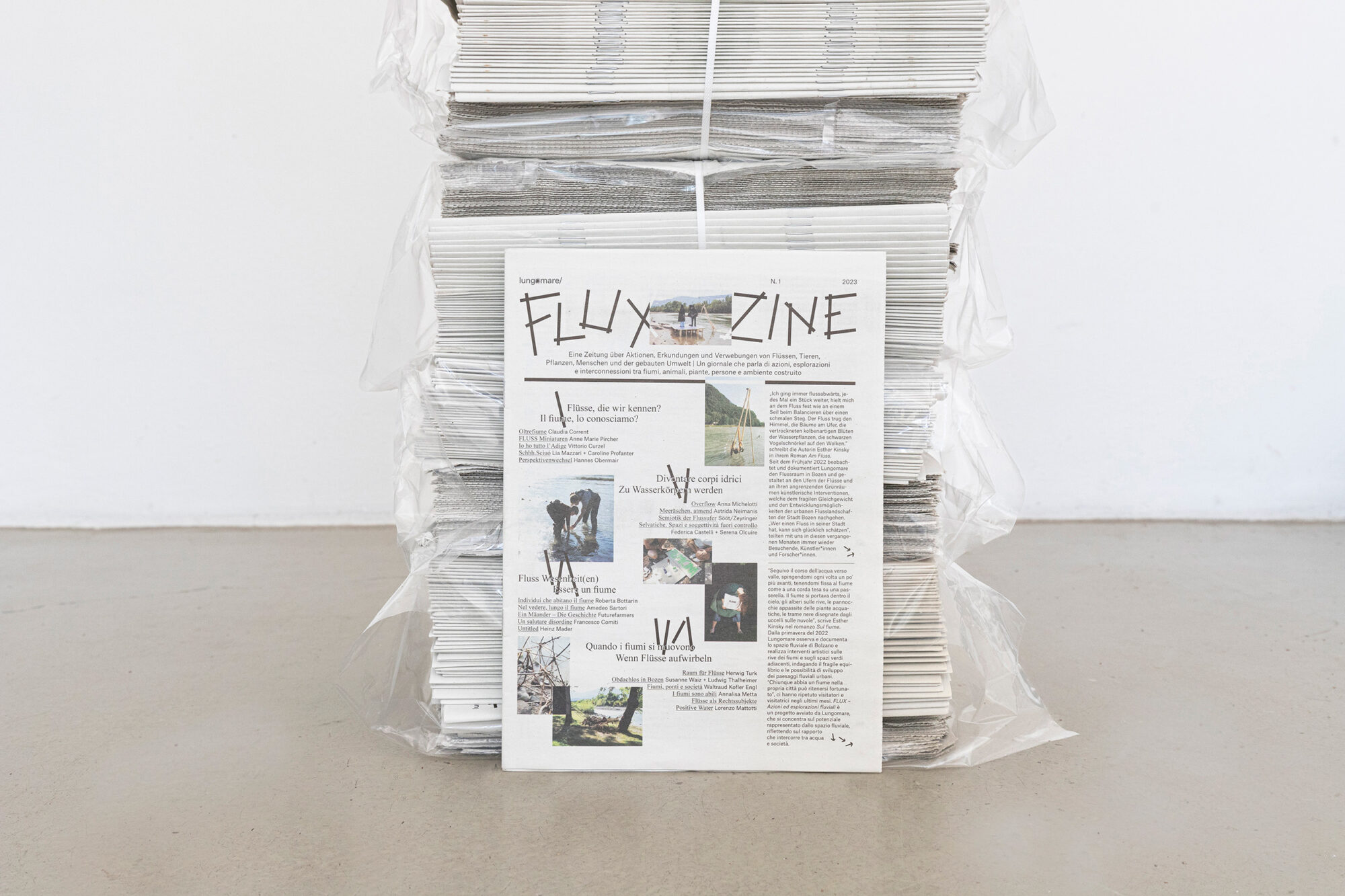
November 4, 2024
New issue out now.
With contributions by Andrea Melenje Argote, Emiliano Guaraldo and Federico Luisetti. More information here
FLUX-Zine illuminates the river landscapes of Bolzano and elsewhere on 32 pages, interviews scientists as well as residents, creates space for artistic and lyrical contributions and opens unexpected insights into the interweavings of human and river.
The magazine brings together four distinct narratives, each exploring how people connect with rivers. Real contributions blend with fictional, political with poetic, creating a rich, layered portrait of rivers and their significance. How does global water scarcity impact river ecosystems? Can a river attain legal personhood? Who has access to rivers and their banks, and how should we shape these public spaces for the future?
New issue out now.
FLUX-Zine 2
With contributions by Andrea Melenje Argote, Emiliano Guaraldo and Federico Luisetti. More information here
FLUX-Zine illuminates the river landscapes of Bolzano and elsewhere on 32 pages, interviews scientists as well as residents, creates space for artistic and lyrical contributions and opens unexpected insights into the interweavings of human and river.
The magazine brings together four distinct narratives, each exploring how people connect with rivers. Real contributions blend with fictional, political with poetic, creating a rich, layered portrait of rivers and their significance. How does global water scarcity impact river ecosystems? Can a river attain legal personhood? Who has access to rivers and their banks, and how should we shape these public spaces for the future?
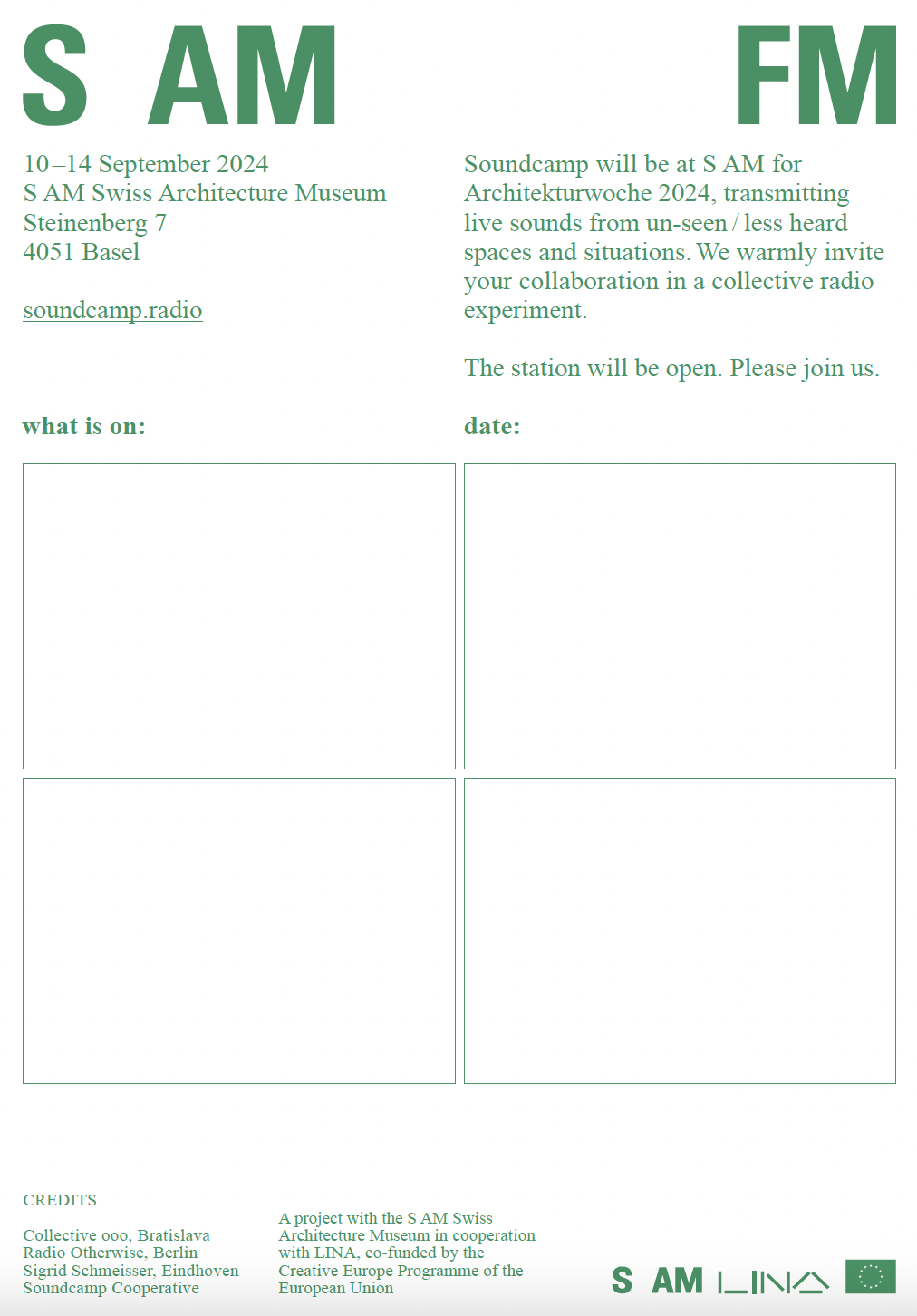
September 10-14, 2024
Soundcamp during Architekturwoche Basel
During the Architekturwoche Basel 2024 («Hidden Spaces»), SAM (Swiss Architecture Museum) and Soundcamp cooperative invited three artists of the LINA Community to create sound-based interventions in the ecological radio program titled «S AM FM».
More information here
Centre to Periphery is a long-term project by Sigrid Schmeisser that investigates landfills obscured by language and modern waste management networks. In the context of «S AM FM», contested spaces related to waste streams in the city of Basel are investigated to create both live environmental sound and a voice-over which offers a counter-narrative on the alleged periphery.
The intervention encompasses three lecture performances on successive days, transmitted live from three different sites in the Basel region: Deponie Elbisgraben (Liestal, CH), Muttenz Water Purification Plant (Muttenz, CH), Swiss-French Border (Huningue, FR). It culminates in a fourth event from the 'centre' in the Swiss Architecture Museum with a performance and video projection of «The Geospatial Other».
Poster design by Soundcamp cooperative. LINA Community.
Soundcamp during Architekturwoche Basel
S AM FM: Centre to Periphery
During the Architekturwoche Basel 2024 («Hidden Spaces»), SAM (Swiss Architecture Museum) and Soundcamp cooperative invited three artists of the LINA Community to create sound-based interventions in the ecological radio program titled «S AM FM».
More information here
Centre to Periphery is a long-term project by Sigrid Schmeisser that investigates landfills obscured by language and modern waste management networks. In the context of «S AM FM», contested spaces related to waste streams in the city of Basel are investigated to create both live environmental sound and a voice-over which offers a counter-narrative on the alleged periphery.
The intervention encompasses three lecture performances on successive days, transmitted live from three different sites in the Basel region: Deponie Elbisgraben (Liestal, CH), Muttenz Water Purification Plant (Muttenz, CH), Swiss-French Border (Huningue, FR). It culminates in a fourth event from the 'centre' in the Swiss Architecture Museum with a performance and video projection of «The Geospatial Other».
Poster design by Soundcamp cooperative. LINA Community.
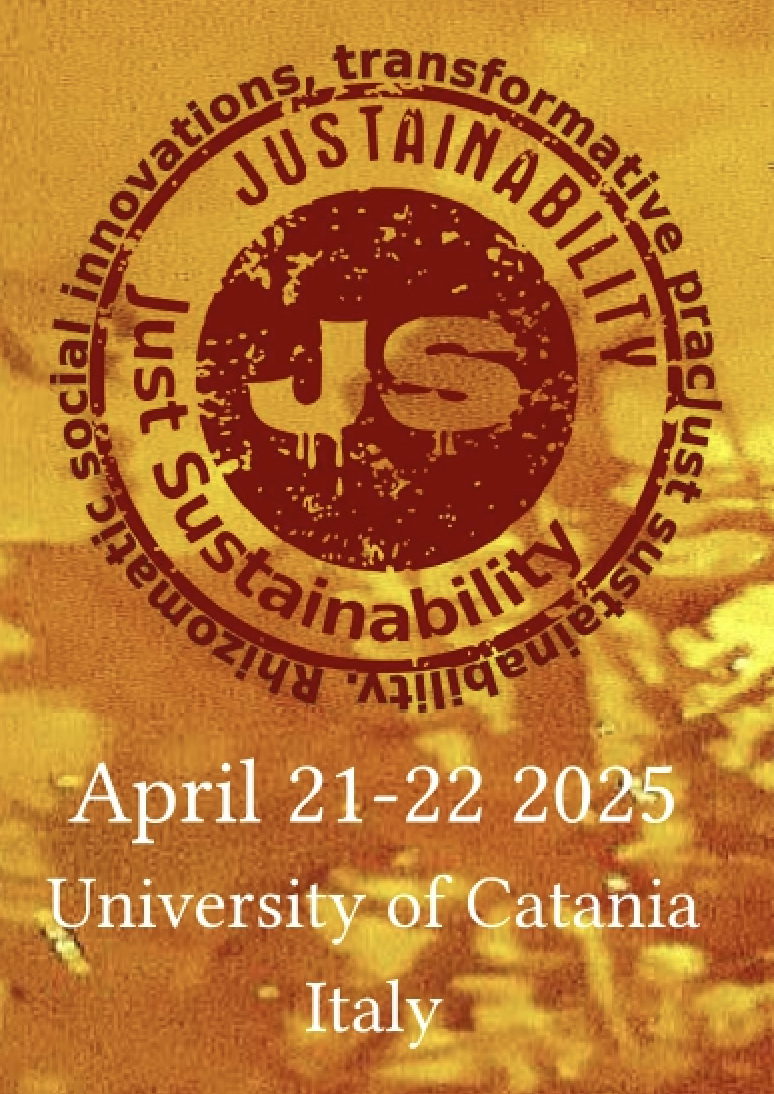
April 21-22 2025
Transformative Workshop
Catania, Italy
University of Catania
Application via email, see below
JUSTAINABILITY is organizing an international workshop dedicated to discussing experiences of social mobilization, co-production of knowledge, and experimentation with alternatives in frontline communities.
Building on the theory of the Wasteocene (Armiero 2021), the workshop will focus on a key socio-environmental sustainability challenge: contamination and waste. In our view, wasting is more than the production of material residues; we are interested in wasting as the socio-ecological relationships that produce wasted communities and ecosystems.
We welcome papers that address the performative power of environmental justice movements through diverse approaches and themes. To foster fruitful conversations among all participants, the workshop will assume pre-circulated papers and shorter oral presentations. The objective is to produce an edited volume derived from the workshop.
Please send your submission to armiero(at)icrea.cat. Write in the subject line: "Submission for the Justainability Workshop." In your submission, please indicate if you need financial support and clarify whether it is essential for your attendance at the workshop. We will consider the possibility of including a limited number of online presentations.
JUSTAINABILITY is a research project funded by the Italian Ministry of University and Research exploring social innovations generated in the struggles for environmental justice.
Transformative Workshop
Catania, Italy
University of Catania
Application via email, see below
Justainability – Just Sustainability
JUSTAINABILITY is organizing an international workshop dedicated to discussing experiences of social mobilization, co-production of knowledge, and experimentation with alternatives in frontline communities.
Building on the theory of the Wasteocene (Armiero 2021), the workshop will focus on a key socio-environmental sustainability challenge: contamination and waste. In our view, wasting is more than the production of material residues; we are interested in wasting as the socio-ecological relationships that produce wasted communities and ecosystems.
We welcome papers that address the performative power of environmental justice movements through diverse approaches and themes. To foster fruitful conversations among all participants, the workshop will assume pre-circulated papers and shorter oral presentations. The objective is to produce an edited volume derived from the workshop.
Please send your submission to armiero(at)icrea.cat. Write in the subject line: "Submission for the Justainability Workshop." In your submission, please indicate if you need financial support and clarify whether it is essential for your attendance at the workshop. We will consider the possibility of including a limited number of online presentations.
JUSTAINABILITY is a research project funded by the Italian Ministry of University and Research exploring social innovations generated in the struggles for environmental justice.

August 27-30 2024
Agir pour le Vivant
Résidence de travail
More information and application here
In the face of Terricide, we are calling for collective action to meet and shape public action, to make the stewardship and care of territories a driving force for collective reinvention. We are calling for a new way of inhabiting the earth. We are calling for a relational and political ecology, for a revolution in the Care of Living Territories. A week to meet and exchange ideas with a group of international speakers from different backgrounds and reflect on the ecological, political and social transformations we are experiencing, in order to envisage other desirable horizons.
Supported by the Banque des Territoires, coordinated by Catalina Mesa - Vision Suroeste, Raphaël Mathevet, Research Director at the CNRS and François Bousquet, Research Director at CIRAD, in collaboration with La Transicionada - Arturo Escobar and Maria Campo. With Federico Luisetti, Maria Campo, Catalina Mesa, Raphaël Mathevet, François Bousquet.
Agir pour le Vivant
Résidence de travail
More information and application here
Vers des territoires pluriversels
In the face of Terricide, we are calling for collective action to meet and shape public action, to make the stewardship and care of territories a driving force for collective reinvention. We are calling for a new way of inhabiting the earth. We are calling for a relational and political ecology, for a revolution in the Care of Living Territories. A week to meet and exchange ideas with a group of international speakers from different backgrounds and reflect on the ecological, political and social transformations we are experiencing, in order to envisage other desirable horizons.
Supported by the Banque des Territoires, coordinated by Catalina Mesa - Vision Suroeste, Raphaël Mathevet, Research Director at the CNRS and François Bousquet, Research Director at CIRAD, in collaboration with La Transicionada - Arturo Escobar and Maria Campo. With Federico Luisetti, Maria Campo, Catalina Mesa, Raphaël Mathevet, François Bousquet.
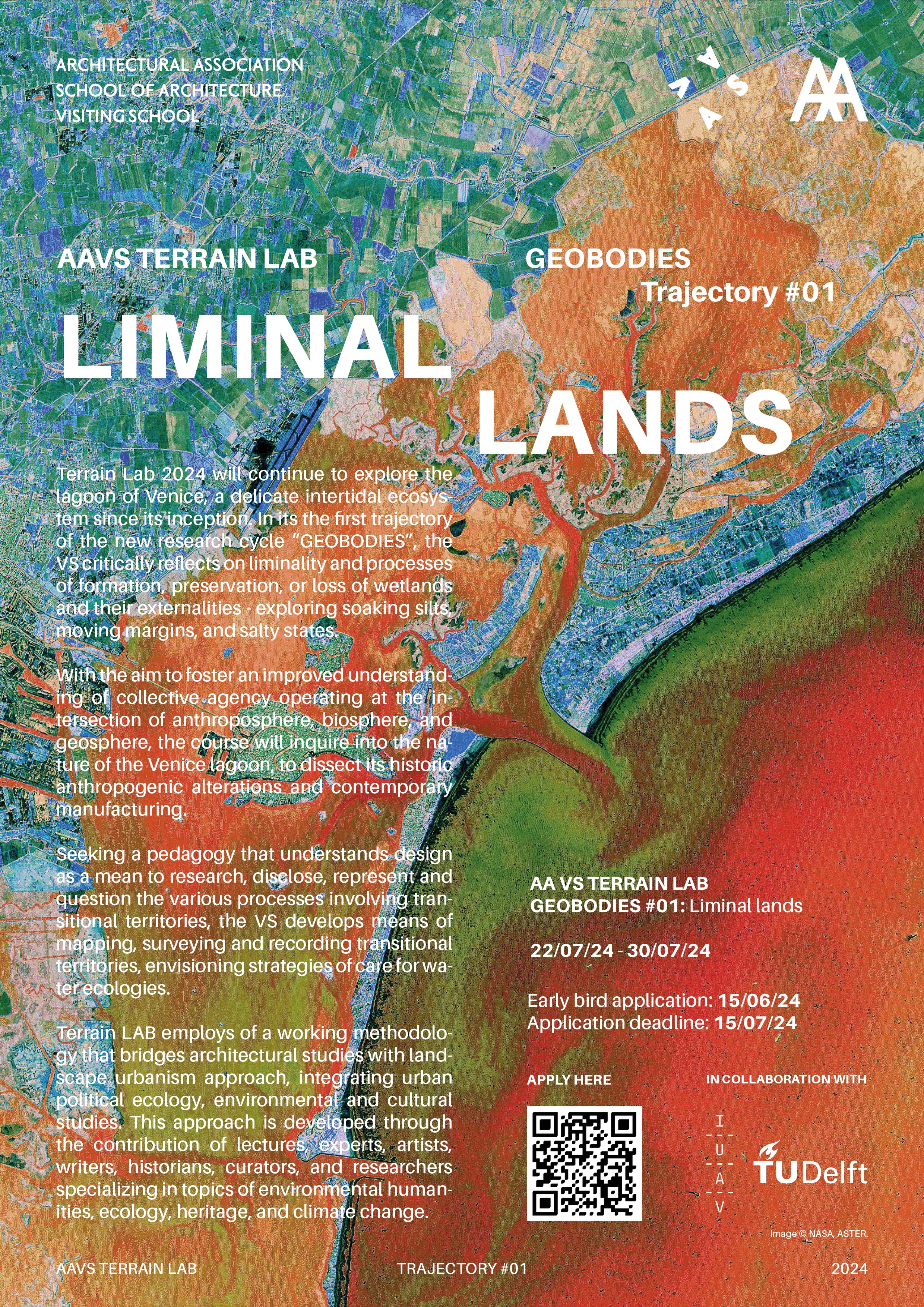
July 22-30 2024
Terrain Lab GEOBODIES
Venice, Italy
AA Visiting School
More information and application here
Terrain Lab 2024 will continue exploring the lagoon of Venice, one of the most delicate intertidal ecosystems since its millenary inception. In its new trajectory of study titled Geobodies, exploring soaking silts, moving margins and salty states, this Visiting School programme will critically reflect on liminality and processes of formation, preservation and loss of wetland ecologies and their externalities.
With the aim to foster an improved understanding of collective agency operating at the intersection of anthroposphere, biosphere, and geosphere, the course will inquire into the nature of the Venice lagoon, to dissect its historic anthropogenic alterations and contemporary alterations. Seeking a pedagogy that understands design as a mean to research, disclose, represent and question the various processes involving transitional territories, the VS develops means of mapping, surveying and recording transitional landscapes, envisioning strategies of care for water ecologies.
The programme is open to current landscape, architecture, and design students, PhD candidates and young professionals, as well as to those studying humanities, geography, philosophy, material and cultural studies. Software Requirements: QGIS or ARCMAP, Adobe Creative Suite, AutoCad or Rhino. The deadline for applications is: 07 July 2024
Terrain Lab GEOBODIES
Venice, Italy
AA Visiting School
More information and application here
Liminal Lands
Terrain Lab 2024 will continue exploring the lagoon of Venice, one of the most delicate intertidal ecosystems since its millenary inception. In its new trajectory of study titled Geobodies, exploring soaking silts, moving margins and salty states, this Visiting School programme will critically reflect on liminality and processes of formation, preservation and loss of wetland ecologies and their externalities.
With the aim to foster an improved understanding of collective agency operating at the intersection of anthroposphere, biosphere, and geosphere, the course will inquire into the nature of the Venice lagoon, to dissect its historic anthropogenic alterations and contemporary alterations. Seeking a pedagogy that understands design as a mean to research, disclose, represent and question the various processes involving transitional territories, the VS develops means of mapping, surveying and recording transitional landscapes, envisioning strategies of care for water ecologies.
The programme is open to current landscape, architecture, and design students, PhD candidates and young professionals, as well as to those studying humanities, geography, philosophy, material and cultural studies. Software Requirements: QGIS or ARCMAP, Adobe Creative Suite, AutoCad or Rhino. The deadline for applications is: 07 July 2024
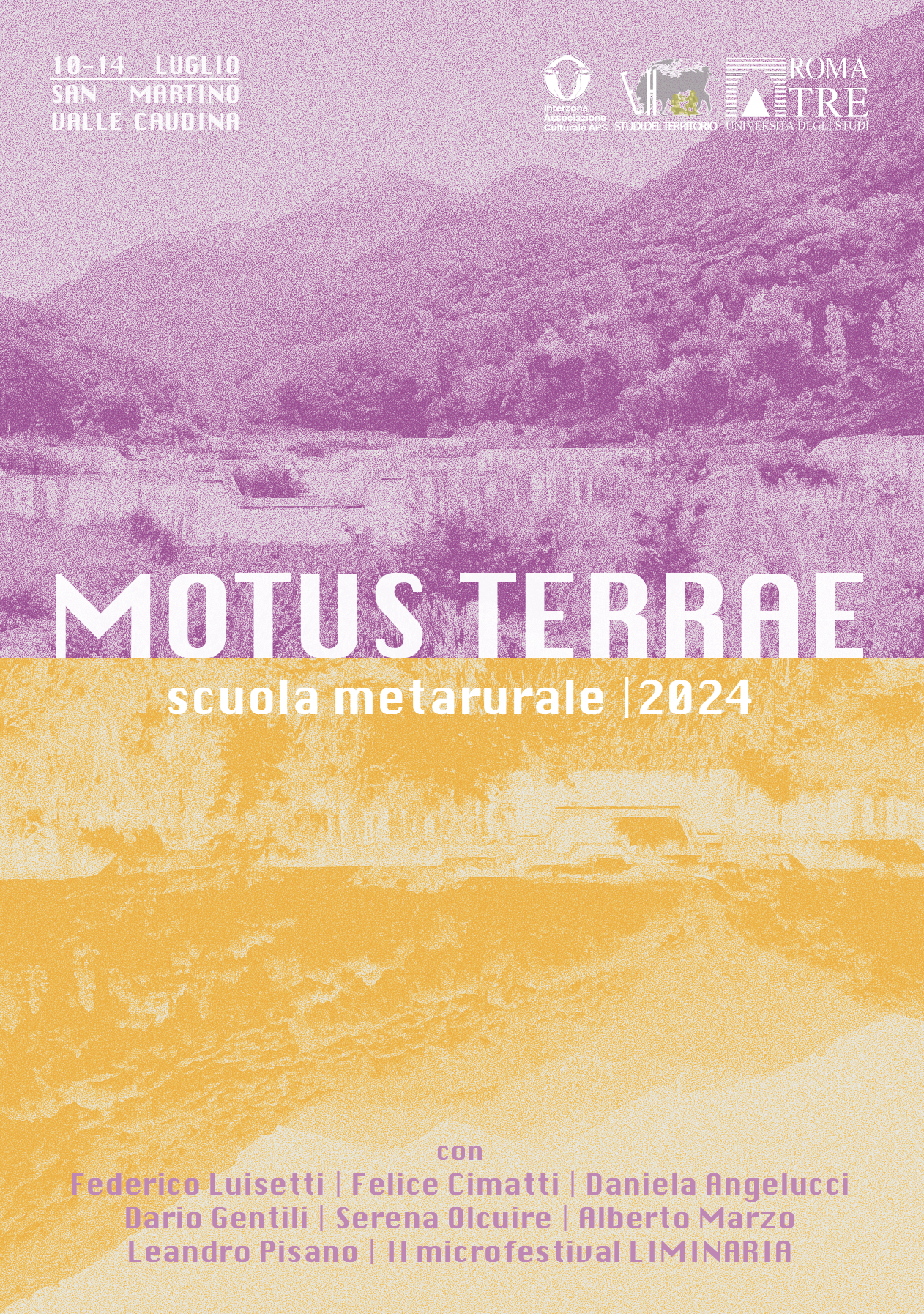
July 10-14 2024
San Martino, Valle Caudina, Italy
scuola metarurale 2024
More information here
Summer school of the MA program Environmental Humanities – Studi dell’ambiente e del territorio, Roma Tre. Participants will explore the local area of Valle Caudina and engage with territorial narration. The metarural school will be intertwined with the microfestival @aps.interzona (Interzona Cultural Association) and the artistic practices it convenes on the territory.
San Martino, Valle Caudina, Italy
scuola metarurale 2024
More information here
Motus Terrae
Summer school of the MA program Environmental Humanities – Studi dell’ambiente e del territorio, Roma Tre. Participants will explore the local area of Valle Caudina and engage with territorial narration. The metarural school will be intertwined with the microfestival @aps.interzona (Interzona Cultural Association) and the artistic practices it convenes on the territory.
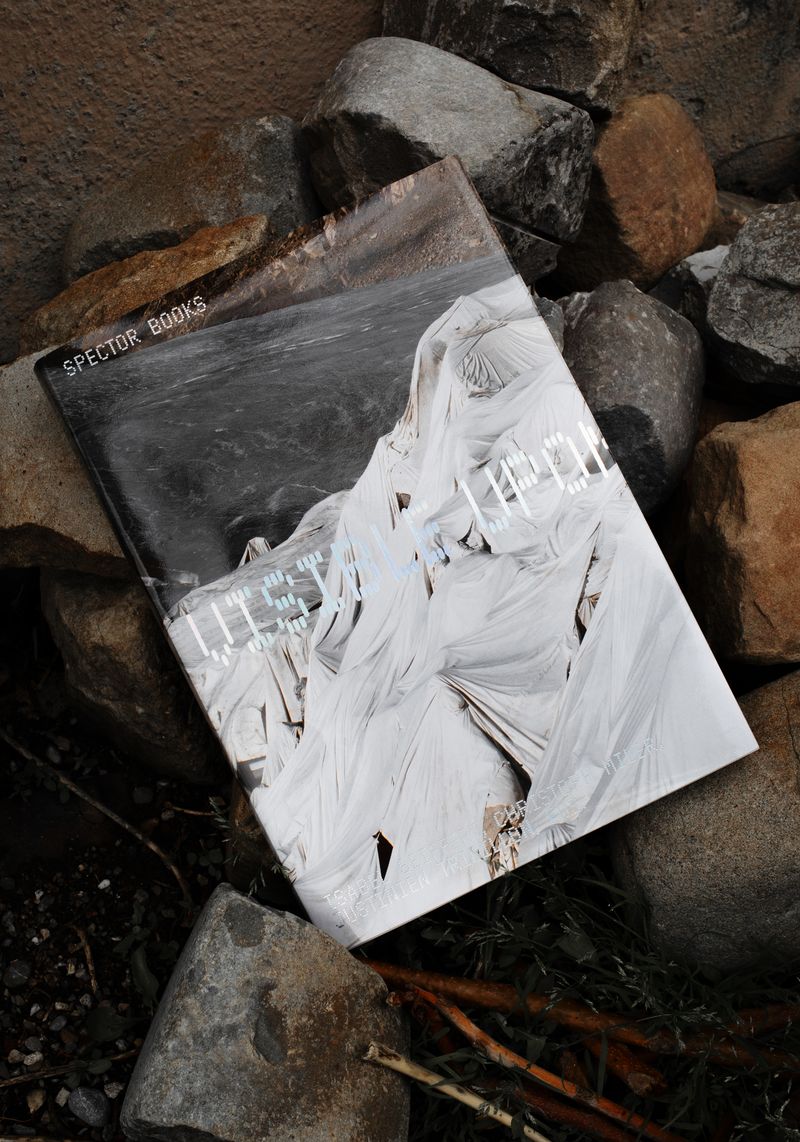
April, 2024
ISBN: 9783959057554
Editors: Justinien Tribillon, Offshore (Isabel Seiffert & Christoph Miler); Design: Offshore
More information here
The space we live in is one of movement, of transit. But we are so used to living in this hypermodern world that we do not see the flows that make up our lives. They are invisible, hidden in plain sight—until they break down. The war in Ukraine disrupting wheat exports, Covid-19 and the wood shortages impacting construction sites worldwide: these events are not only human tragedies, they also act as urgent reminders of our global interdependence.
By creating a transdisciplinary discussion across photography, social science, and architecture, Visible upon Breakdown questions the cultural, political and ecological nature of infrastructure. It investigates the relationship between the tangible physical components of railroads, water supply or communication systems on the one hand and their intrinsic political and social values on the other.
Visible upon Breakdown includes photographic essays by
Eline Benjaminsen and Elias Kimaiyo
Sim Chi Yin
Matthieu Gafsou
Étienne Malapert
Offshore (Isabel Seiffert & Christoph Miler)
Lise Straatsma
Katrin Streicher
Salvatore Vitale
And new commissioned texts written by
Armelle Choplin
Gabriella Garcia
Charlotte Malterre-Barthes
Justinien Tribillon
ISBN: 9783959057554
Editors: Justinien Tribillon, Offshore (Isabel Seiffert & Christoph Miler); Design: Offshore
More information here
Visible Upon Breakdown: Exploring the Cultural, Political and Spatial Nature of Infrastructure
The space we live in is one of movement, of transit. But we are so used to living in this hypermodern world that we do not see the flows that make up our lives. They are invisible, hidden in plain sight—until they break down. The war in Ukraine disrupting wheat exports, Covid-19 and the wood shortages impacting construction sites worldwide: these events are not only human tragedies, they also act as urgent reminders of our global interdependence.
By creating a transdisciplinary discussion across photography, social science, and architecture, Visible upon Breakdown questions the cultural, political and ecological nature of infrastructure. It investigates the relationship between the tangible physical components of railroads, water supply or communication systems on the one hand and their intrinsic political and social values on the other.
Visible upon Breakdown includes photographic essays by
Eline Benjaminsen and Elias Kimaiyo
Sim Chi Yin
Matthieu Gafsou
Étienne Malapert
Offshore (Isabel Seiffert & Christoph Miler)
Lise Straatsma
Katrin Streicher
Salvatore Vitale
And new commissioned texts written by
Armelle Choplin
Gabriella Garcia
Charlotte Malterre-Barthes
Justinien Tribillon
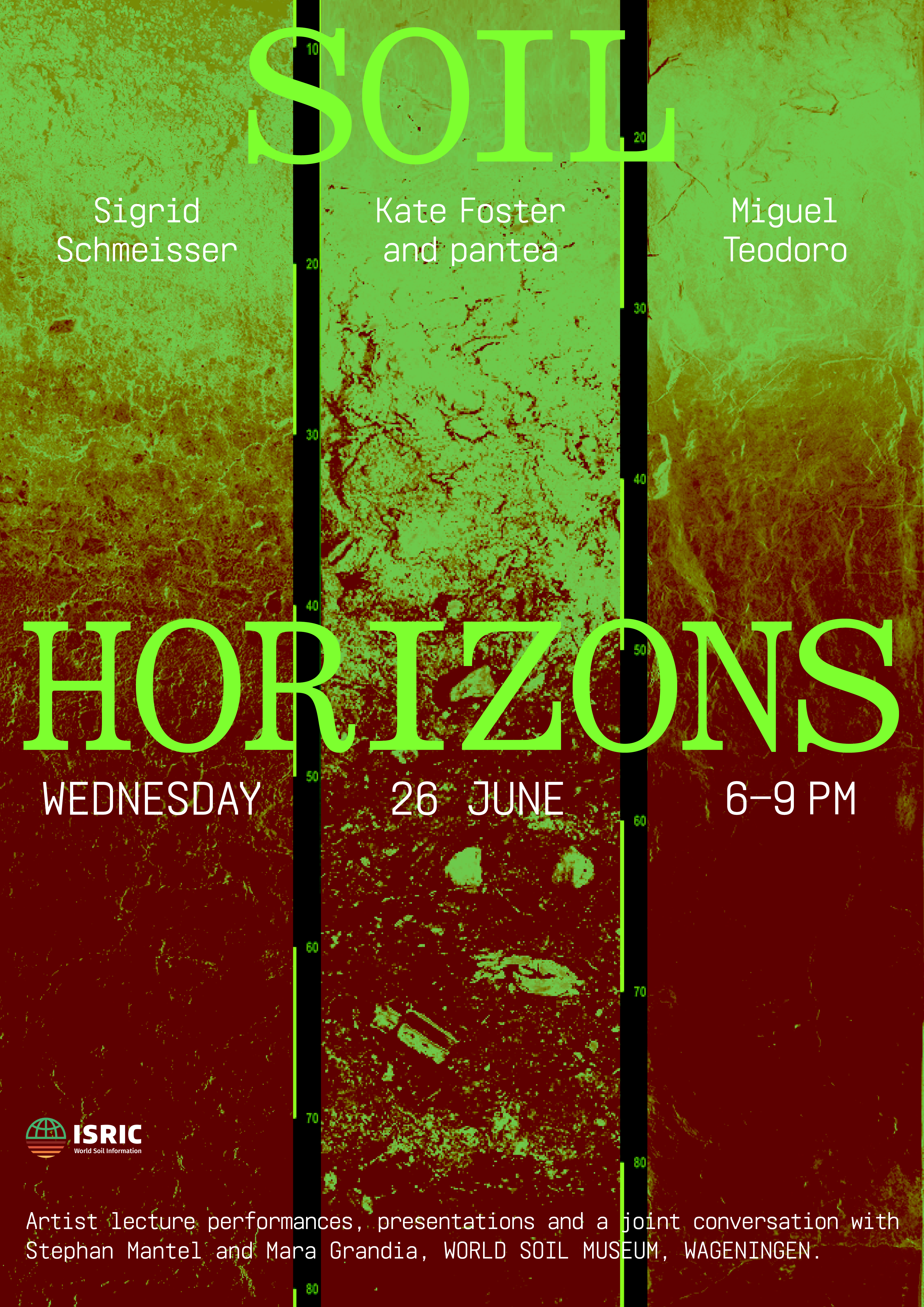
June 26, 2024
6-9 pm
ISRIC — World Soil Information
3 Droevendaalsesteeg
6708 PB Wageningen
Netherlands
With Sigrid Schmeisser, Kate Foster, pantea, Miguel Teodoro
More information here
Over the last decades, it has become ever more evident that due to mismanagement and the effects of global warming, we will lose most vital topsoil within the next 60 years. Across territories, both human interventions and climatic events lead towards ecosystem loss and soil exhaustion, with rivers washing valuable soil into the ocean, the loss of wetlands and the impacts of agriculture. Under the theme of »Soil Horizons«, three artists are responding to three different soil classifications present within the World Soil Museum.
Soil Horizons also opens up the space to debate on the futures of these territories, their contradictions and how we perceive and treat soil in the long run. It also seeks to strengthen closer ties between the arts & science, for the former is able to reframe and capture narratives surrounding these entangled ecosystems and foster thereby literacy alike. At the end of the talks and presentation there will be a discussion with Stephan Mantel and Mara Grandia (ISRIC WORLD SOIL MUSEUM), as well as a small food tasting in relation to the soils presented.
6-9 pm
ISRIC — World Soil Information
3 Droevendaalsesteeg
6708 PB Wageningen
Netherlands
With Sigrid Schmeisser, Kate Foster, pantea, Miguel Teodoro
More information here
Soil Horizons
Over the last decades, it has become ever more evident that due to mismanagement and the effects of global warming, we will lose most vital topsoil within the next 60 years. Across territories, both human interventions and climatic events lead towards ecosystem loss and soil exhaustion, with rivers washing valuable soil into the ocean, the loss of wetlands and the impacts of agriculture. Under the theme of »Soil Horizons«, three artists are responding to three different soil classifications present within the World Soil Museum.
Soil Horizons also opens up the space to debate on the futures of these territories, their contradictions and how we perceive and treat soil in the long run. It also seeks to strengthen closer ties between the arts & science, for the former is able to reframe and capture narratives surrounding these entangled ecosystems and foster thereby literacy alike. At the end of the talks and presentation there will be a discussion with Stephan Mantel and Mara Grandia (ISRIC WORLD SOIL MUSEUM), as well as a small food tasting in relation to the soils presented.
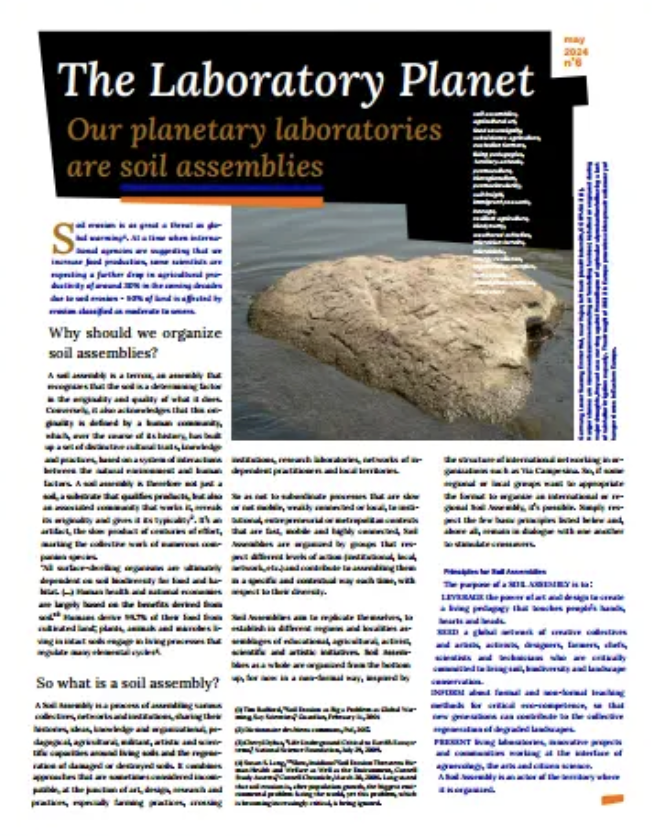
May 2024
THE LABORATORY PLANET
Issue N° 6
Laboratories for habitable futures
General information here, text «Plantation Planet» by Federico Luisetti here
We're delighted to announce the publication of issue no. 6 of The Laboratory Planet. The journal The Laboratory Planet was created in 2007, based on the intuition that from a “factory planet” it was necessary to move on to the analysis of a “laboratory planet” – where “acceptable risk” is the adjustment variable for experiments on a scale of 1. At a time when living conditions are deteriorating ever further, ecologically as well as socially and humanly, this is the direction we propose to take. In this issue, we imagine a peasant and neo-peasant future, invented by planetary peasants, organized in diverse territories, cultivating biotopes that are more heterogeneous, more democratic, and therefore more habitable than those of imperial cities.
THE LABORATORY PLANET
Issue N° 6
Laboratories for habitable futures
General information here, text «Plantation Planet» by Federico Luisetti here
Soil Assembly special • Planetary Peasants
We're delighted to announce the publication of issue no. 6 of The Laboratory Planet. The journal The Laboratory Planet was created in 2007, based on the intuition that from a “factory planet” it was necessary to move on to the analysis of a “laboratory planet” – where “acceptable risk” is the adjustment variable for experiments on a scale of 1. At a time when living conditions are deteriorating ever further, ecologically as well as socially and humanly, this is the direction we propose to take. In this issue, we imagine a peasant and neo-peasant future, invented by planetary peasants, organized in diverse territories, cultivating biotopes that are more heterogeneous, more democratic, and therefore more habitable than those of imperial cities.

May 30, 2024
6 – 6:45 pm
ETH Zurich, ONA
Neunbrunnenstrasse 50
8050 Zürich
Book Launch at Design in Dialogue Lab.
More information here
How can landscape and urban studies more effectively engage in transdisciplinary dialogue, sensuousness and affect, and pluriversal worlds? Researching Otherwise presents sensory, collaborative, and restitutive methodological tools for crafting new spaces of knowledge production.
Through activities such as drawing, photographing, sounding, listening, filmmaking, walking, and mapmaking, researchers explore regenerative futures in new ways. They reveal how they follow non-human companions in multi-species walks; engage in multisensory, cinematic, and performative ways of knowing; explore ocean worlds; unsilence bank vaults; and collaborate in visual ethnographic investigations with refugees.
6 – 6:45 pm
ETH Zurich, ONA
Neunbrunnenstrasse 50
8050 Zürich
Book Launch at Design in Dialogue Lab.
More information here
Researching Otherwise – Pluriversal Methodologies for Landscape and Urban Studies
How can landscape and urban studies more effectively engage in transdisciplinary dialogue, sensuousness and affect, and pluriversal worlds? Researching Otherwise presents sensory, collaborative, and restitutive methodological tools for crafting new spaces of knowledge production.
Through activities such as drawing, photographing, sounding, listening, filmmaking, walking, and mapmaking, researchers explore regenerative futures in new ways. They reveal how they follow non-human companions in multi-species walks; engage in multisensory, cinematic, and performative ways of knowing; explore ocean worlds; unsilence bank vaults; and collaborate in visual ethnographic investigations with refugees.
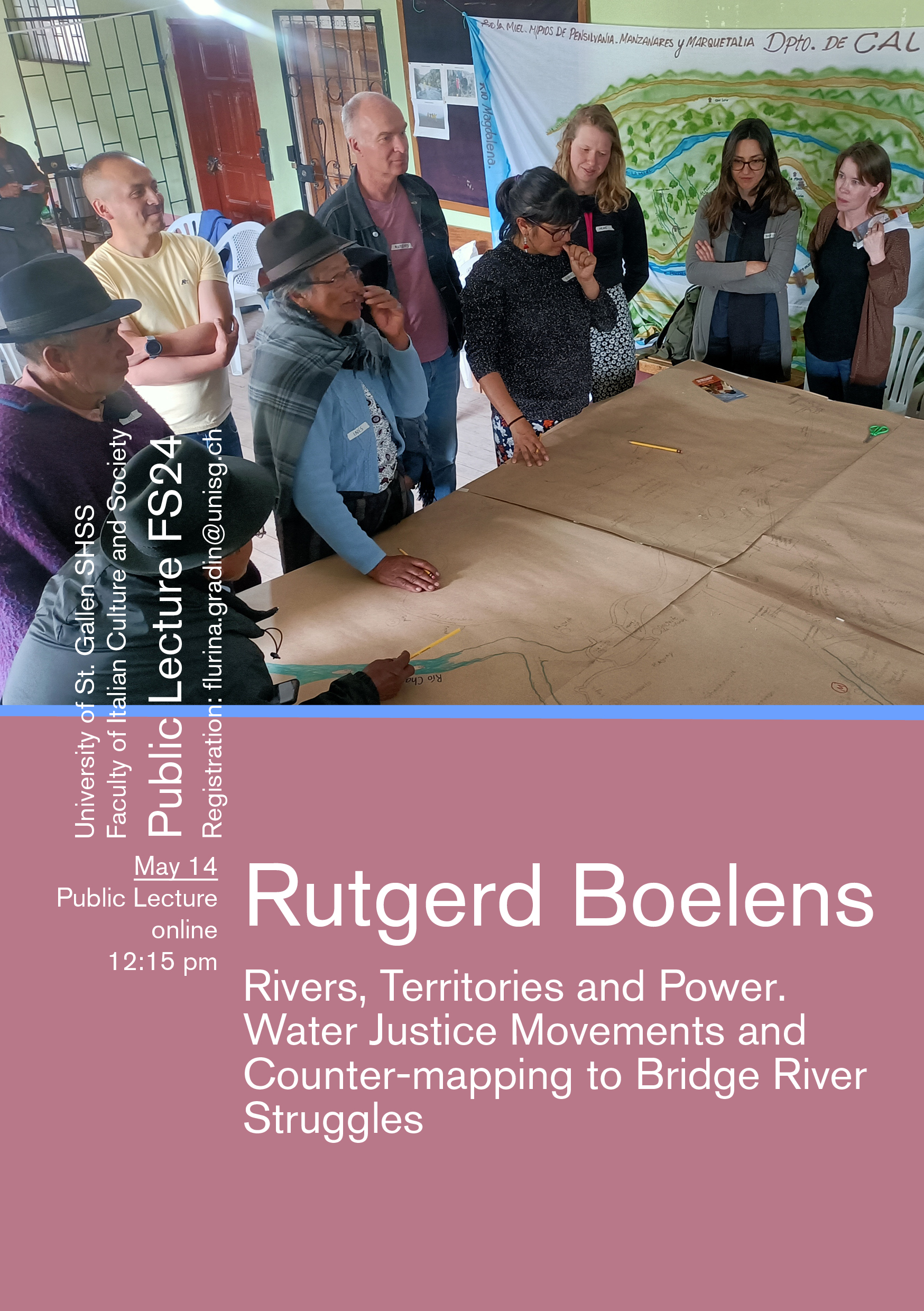
May 14, 2024
12:15 pm
Online Event
Guest lecture with Rutgerd Boelens at the University of St. Gallen. Registration here
Mega-damming, pollution and depletion endanger rivers worldwide. Modernist imaginaries of ordering ‘unruly waters and humans’ have become cornerstones of hydraulic-bureaucratic and capitalist development. They separate hydro/social worlds, sideline river-commons cultures, and deepen socio-environmental injustices. However, myriad new water justice movements (NWJMs) proliferate: rooted, disruptive, transdisciplinary, multi-scalar coalitions that deploy alternative river–society ontologies, bridge South–North divides, and translate river-enlivening practices from local to global and vice-versa.
In this guest lecture, Rutgerd Boelens presents a collective framework that conceptualizes ‘riverhood’ to engage with NWJMs and river commoning initiatives. It suggests four interrelated ontologies, situating river socionatures as arenas of material, social and symbolic co-production: ‘river-as-ecosociety’, ‘river-as-territory’, ‘river-as-subject’, and ‘river-as-movement’. Boelens further examines the Traveling Rivers initiative, linking grassroots activists, engaged academia and river commoning struggles through counter-mapping. Making rivers actively travel among six river conflict arenas in Colombia and Ecuador, the initiative seeks new grass-rooted understandings capable of strengthening ‘rivers of resistance’ that break away from river grabbing and imposed status quo river governance.
Rutgerd Boelens is Professor ‘Water Governance and Social Justice’ at Wageningen University, The Netherlands, and Professor ‘Political Ecology of Water’ with CEDLA, University of Amsterdam. He is also a Visiting Professor at the Catholic University of Peru and the Central University of Ecuador. He coordinates the Justicia Hídrica/Water Justice alliance and the international research and action programs “Riverhood” and “River Commons” (www.movingrivers.org). Boelens research focuses on political ecology, water rights, legal pluralism, water cultures and cultural politics, governmentality, hydrosocial territories, river politics, environmental justice and social mobilization, mainly in Latin America and Europe. Recent books: “Water, Power and Identity. The Cultural Politics of Water in the Andes”, “Water Justice”, Cambridge University Press (with T. Perreault & J. Vos), Publications, see: www.researchgate.net/profile/Rutgerd-Boelens and https://research.wur.nl/en/persons/rutgerd-boelens/publications/ and https://wageningen-ur.academia.edu/RutgerdBoelens.
12:15 pm
Online Event
Guest lecture with Rutgerd Boelens at the University of St. Gallen. Registration here
Rivers, Territories and Power. Water Justice Movements and Counter-mapping to Bridge River Struggles
Mega-damming, pollution and depletion endanger rivers worldwide. Modernist imaginaries of ordering ‘unruly waters and humans’ have become cornerstones of hydraulic-bureaucratic and capitalist development. They separate hydro/social worlds, sideline river-commons cultures, and deepen socio-environmental injustices. However, myriad new water justice movements (NWJMs) proliferate: rooted, disruptive, transdisciplinary, multi-scalar coalitions that deploy alternative river–society ontologies, bridge South–North divides, and translate river-enlivening practices from local to global and vice-versa.
In this guest lecture, Rutgerd Boelens presents a collective framework that conceptualizes ‘riverhood’ to engage with NWJMs and river commoning initiatives. It suggests four interrelated ontologies, situating river socionatures as arenas of material, social and symbolic co-production: ‘river-as-ecosociety’, ‘river-as-territory’, ‘river-as-subject’, and ‘river-as-movement’. Boelens further examines the Traveling Rivers initiative, linking grassroots activists, engaged academia and river commoning struggles through counter-mapping. Making rivers actively travel among six river conflict arenas in Colombia and Ecuador, the initiative seeks new grass-rooted understandings capable of strengthening ‘rivers of resistance’ that break away from river grabbing and imposed status quo river governance.
Rutgerd Boelens is Professor ‘Water Governance and Social Justice’ at Wageningen University, The Netherlands, and Professor ‘Political Ecology of Water’ with CEDLA, University of Amsterdam. He is also a Visiting Professor at the Catholic University of Peru and the Central University of Ecuador. He coordinates the Justicia Hídrica/Water Justice alliance and the international research and action programs “Riverhood” and “River Commons” (www.movingrivers.org). Boelens research focuses on political ecology, water rights, legal pluralism, water cultures and cultural politics, governmentality, hydrosocial territories, river politics, environmental justice and social mobilization, mainly in Latin America and Europe. Recent books: “Water, Power and Identity. The Cultural Politics of Water in the Andes”, “Water Justice”, Cambridge University Press (with T. Perreault & J. Vos), Publications, see: www.researchgate.net/profile/Rutgerd-Boelens and https://research.wur.nl/en/persons/rutgerd-boelens/publications/ and https://wageningen-ur.academia.edu/RutgerdBoelens.

April 22, 2024
10:15 – 11:45 am
Hybrid Event
Transdisciplinary conversations in anthropology and beyond. With Nitin Bathla, Rony Emmenegger, Flurina Gradin, Federico Luisetti.
The panel on April 22 will engage with the Earth as experienced in the field, in the context of pluriversal epistemologies. Nitin Bathla will discuss urban-wild enmeshments through the more-than-human ethnography of urban leopards in India. Rony Emmenegger will talk about the political geology of nuclear waste disposal and reflect on how the subterranean is unearthed. Flurina Gradin will present different aspects of biodiversity in the built environment, focusing on a paradigm shift within the discipline of architecture. Federico Luisetti will share what he learned from “earth-beings” that challenge Western notions of personhood and life.
More information here.
10:15 – 11:45 am
Hybrid Event
Transdisciplinary conversations in anthropology and beyond. With Nitin Bathla, Rony Emmenegger, Flurina Gradin, Federico Luisetti.
Ethnographies of the Earth
The panel on April 22 will engage with the Earth as experienced in the field, in the context of pluriversal epistemologies. Nitin Bathla will discuss urban-wild enmeshments through the more-than-human ethnography of urban leopards in India. Rony Emmenegger will talk about the political geology of nuclear waste disposal and reflect on how the subterranean is unearthed. Flurina Gradin will present different aspects of biodiversity in the built environment, focusing on a paradigm shift within the discipline of architecture. Federico Luisetti will share what he learned from “earth-beings” that challenge Western notions of personhood and life.
More information here.
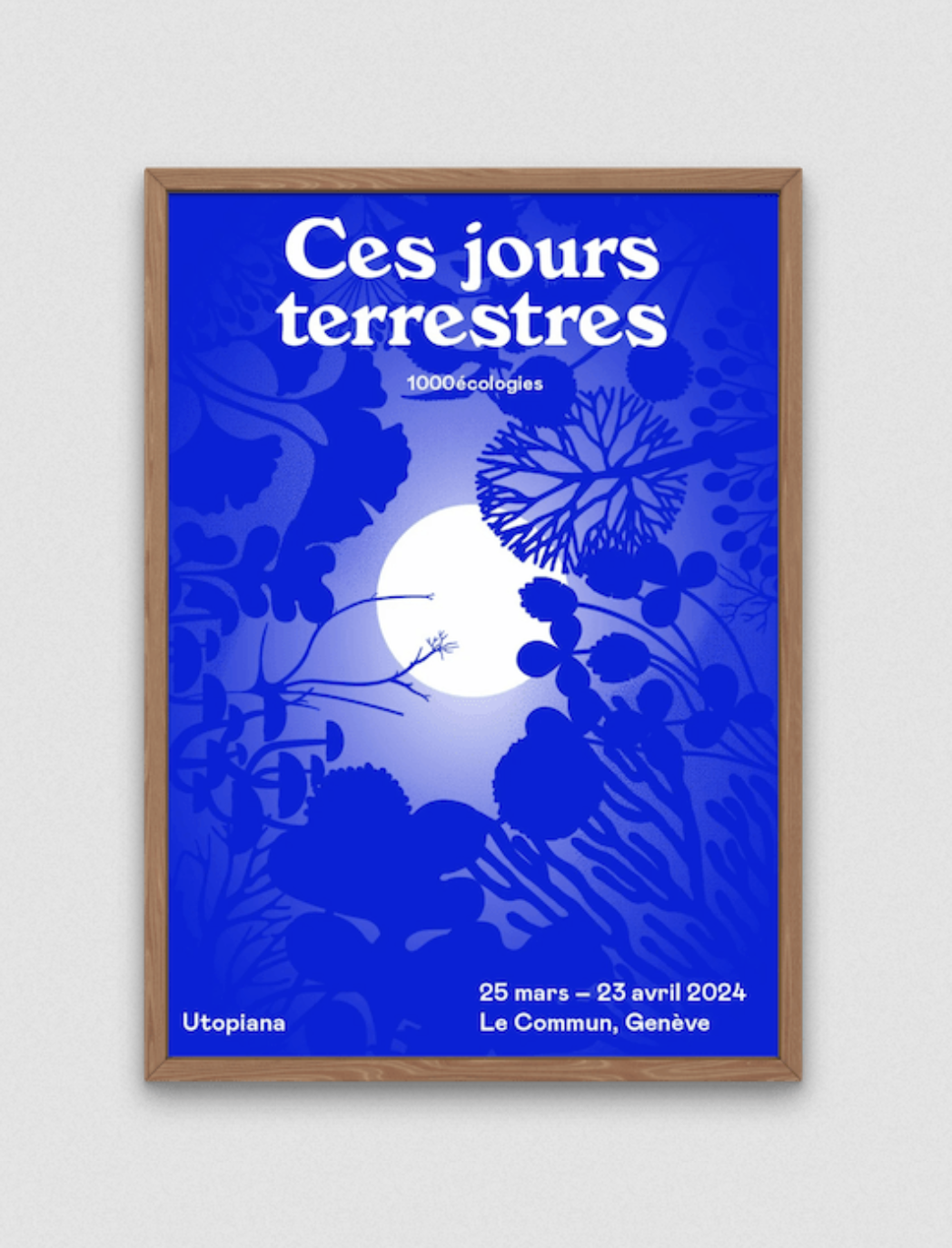
April 21, 2024
4 pm
Utopiana / Au Commun
Rue des Vieux-Grenadiers 10
1205 Genève
What is a river? This is the question being asked by communities, activists and researchers in the Cauca region, Colombia's second largest river. This fertile and biodiverse tropical Andean region is being ravaged by huge sugar cane monocultures. Its diverse population is in conflict because of land grabbing, mining and drug trafficking. Instead of succumbing to this logic, the activists are devising pluralistic relationships with the river that reconfigure their lives in the valley and their perception of nature. In this talk, Federico Luisetti will speak about the research-action project on the Cauca river (Colombia) and its pluriversal approach.
More information about 1000 ecologies and Utopiana here
4 pm
Utopiana / Au Commun
Rue des Vieux-Grenadiers 10
1205 Genève
Pour une approche pluriverselle des rivières
What is a river? This is the question being asked by communities, activists and researchers in the Cauca region, Colombia's second largest river. This fertile and biodiverse tropical Andean region is being ravaged by huge sugar cane monocultures. Its diverse population is in conflict because of land grabbing, mining and drug trafficking. Instead of succumbing to this logic, the activists are devising pluralistic relationships with the river that reconfigure their lives in the valley and their perception of nature. In this talk, Federico Luisetti will speak about the research-action project on the Cauca river (Colombia) and its pluriversal approach.
More information about 1000 ecologies and Utopiana here
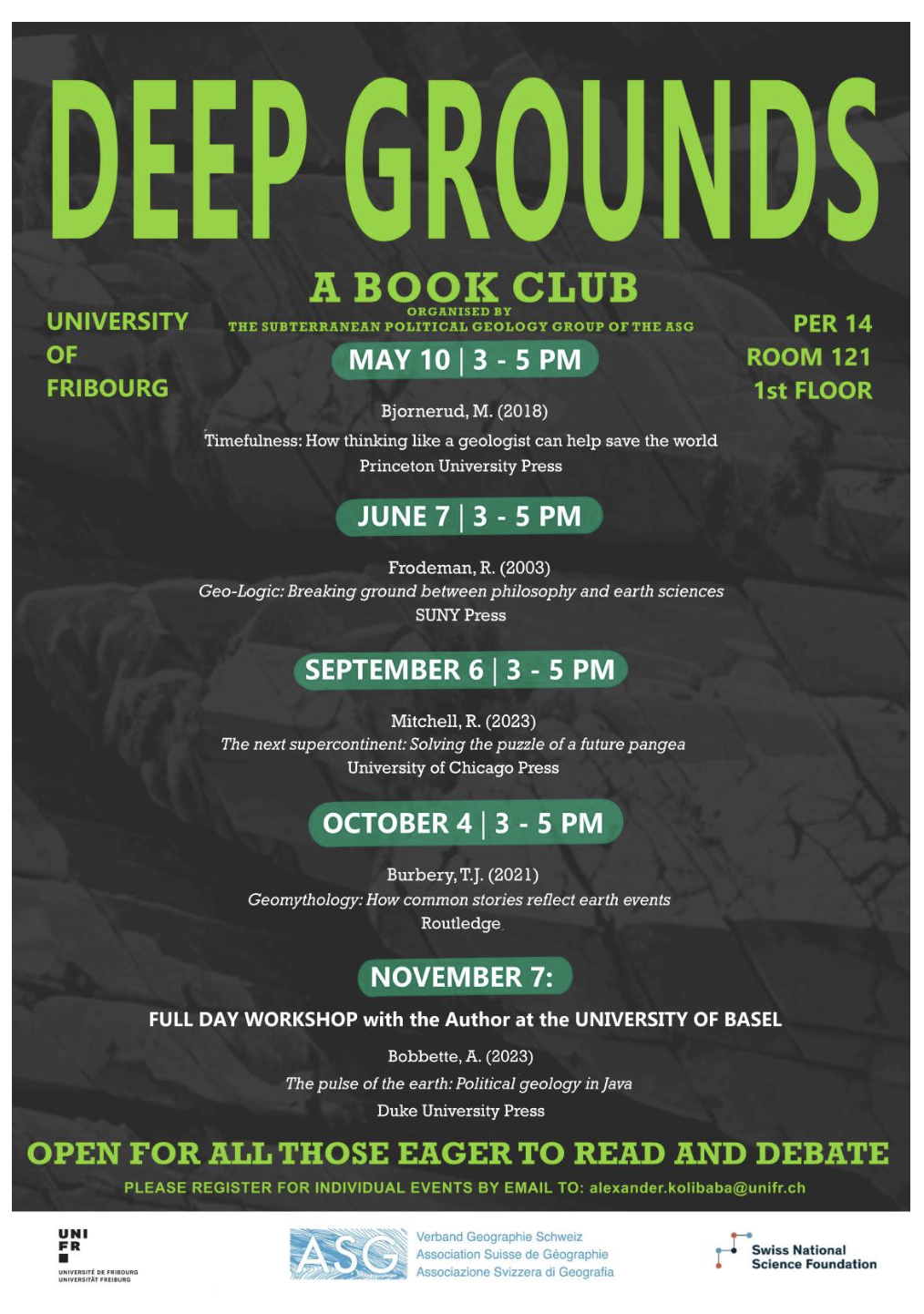
May 10 - November 7, 2024
12:15 pm
Online Event Series
Book club of the Subterranean Political Geology Group of the ASG at the University of Fribourg.
The Subterranean Political Geology Group of the ASG at the University of Fribourg is organising a book club on “Deep Grounds". All events are open to anyone eager to read and debate, and reflect about the nature of geology in the contemporary world. Registration: alexander.kolibaba(at)unifr.ch
12:15 pm
Online Event Series
Book club of the Subterranean Political Geology Group of the ASG at the University of Fribourg.
Deep Grounds
The Subterranean Political Geology Group of the ASG at the University of Fribourg is organising a book club on “Deep Grounds". All events are open to anyone eager to read and debate, and reflect about the nature of geology in the contemporary world. Registration: alexander.kolibaba(at)unifr.ch
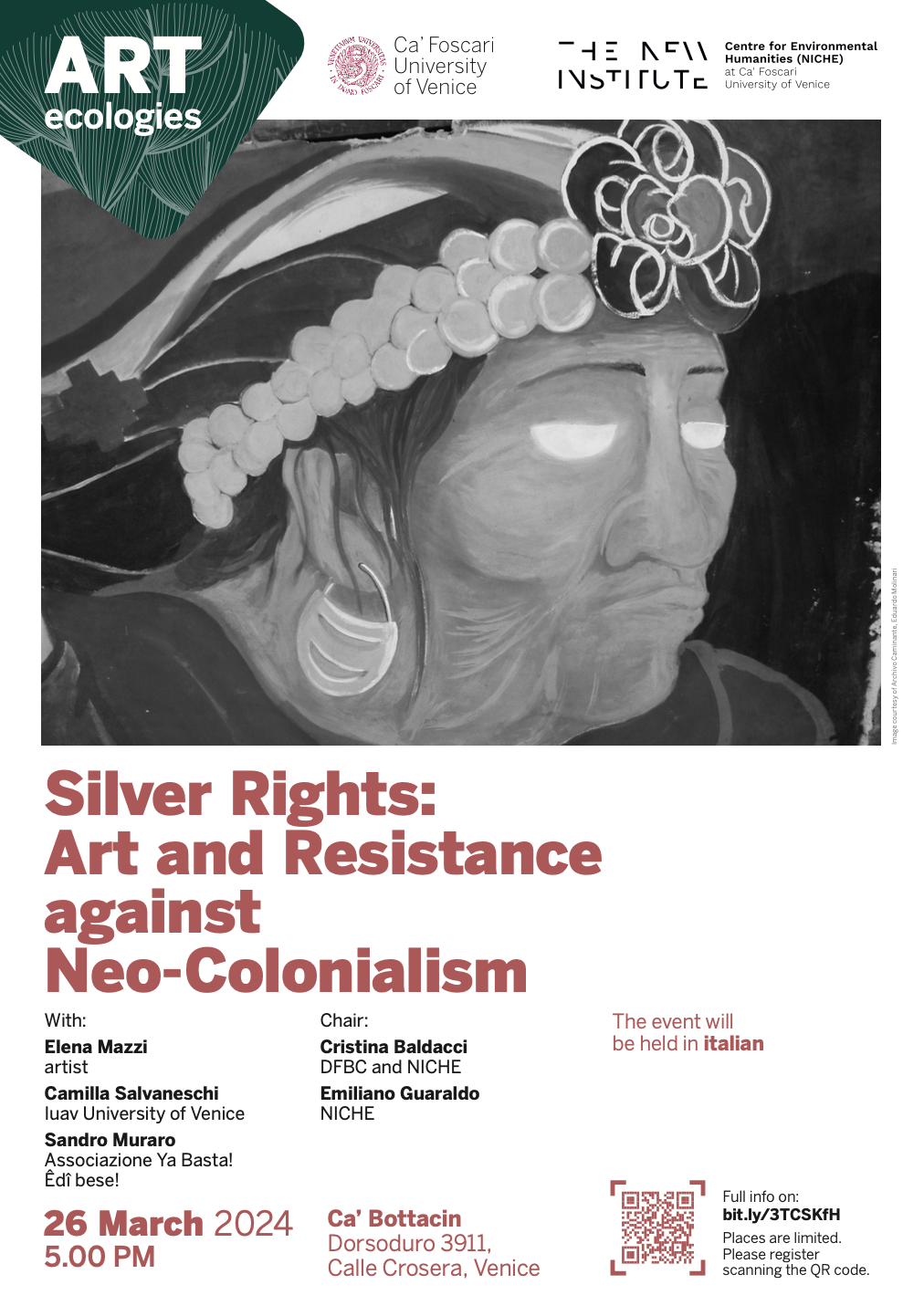
March 26, 2024
5 pm
Online Event
Talk and panel discussion at Ca' Foscari University of Venice. Speakers: Elena Mazzi (artist), Camilla Salvaneschi (Iuav University of Venice), Sandro Muraro (Associazione Ya Basta! Êdî bese!). Chair: Cristina Baldacci (DFBC and NICHE),
Emiliano Guaraldo (NICHE)
Silver Rights is a research project by artist Elena Mazzi in collaboration with Mapuche spiritual leader, silversmith, and activist Mauro Millán, and Argentinian artist Eduardo Molinari. The project explores the resistance of the Mapuche people against neo-colonialism, focusing on the ancestral bond between the communities and their land (mapu). This bond has been eroded and denied by colonizing forces that have mutated over the centuries, gradually establishing themselves in recent decades through neo-extractivist practices, which are the result of a settlement process stemming from the convergence of investment policies and commercial agreements between South American governments and foreign multinationals, including the Italian company Benetton.
Silver Rights will be related to Poc and Encounters, two new video works by the artist on view at Ca' Pesaro, in the context of the series of solo exhibitions "Italian Polyphonies," curated by Camilla Salvaneschi and Angela Vettese.
More information and registration here ︎︎︎
5 pm
Online Event
Talk and panel discussion at Ca' Foscari University of Venice. Speakers: Elena Mazzi (artist), Camilla Salvaneschi (Iuav University of Venice), Sandro Muraro (Associazione Ya Basta! Êdî bese!). Chair: Cristina Baldacci (DFBC and NICHE),
Emiliano Guaraldo (NICHE)
Silver Rights: Art and Resistance against Neo-Colonialism
Silver Rights is a research project by artist Elena Mazzi in collaboration with Mapuche spiritual leader, silversmith, and activist Mauro Millán, and Argentinian artist Eduardo Molinari. The project explores the resistance of the Mapuche people against neo-colonialism, focusing on the ancestral bond between the communities and their land (mapu). This bond has been eroded and denied by colonizing forces that have mutated over the centuries, gradually establishing themselves in recent decades through neo-extractivist practices, which are the result of a settlement process stemming from the convergence of investment policies and commercial agreements between South American governments and foreign multinationals, including the Italian company Benetton.
Silver Rights will be related to Poc and Encounters, two new video works by the artist on view at Ca' Pesaro, in the context of the series of solo exhibitions "Italian Polyphonies," curated by Camilla Salvaneschi and Angela Vettese.
More information and registration here ︎︎︎

March 15 and 16, 2024
10am - 7 pm / 10 am - 2 pm
San Samuele | Palazzo Grassi
Salizada Malipiero 3208
Venice
Tidal Inquiries
Metagoon is a tool for observing and investigating the Venetian lagoon. The project, which was started in 2015 and is still expanding and developing, consists of an archive of footage and interviews that survey the varied and complex aspects of the Venetian lagoon and the communities that inhabit it. Metagoon seeks to cast a light on the knowledge, traditions, transformations, and contradictions of the lagoon ecosystem, creating a map in which borders are outlined by interviews, stories and silent observations.
(Project) Raccogliere started from a more-than-human perspective with salicornia and the Barene at its core. It aims to narrate a rather complex intertidal ecosystem in decline, challenged by global warming, salinisation as well as the loss of population alike. By portraying the plant and other halophytes as vital for the marshlands, as well as by interviewing locals ranging from scientists, chefs, arts & culture who practise acts of regeneration and resistance, new blueprints of living with the lagoon emerge. Project Raccogliere features them in a dedicated zine started in 2023 and continue this work on a platform online (PagineBlue).
10am - 7 pm / 10 am - 2 pm
San Samuele | Palazzo Grassi
Salizada Malipiero 3208
Venice
Tidal Inquiries
Metagoon is a tool for observing and investigating the Venetian lagoon. The project, which was started in 2015 and is still expanding and developing, consists of an archive of footage and interviews that survey the varied and complex aspects of the Venetian lagoon and the communities that inhabit it. Metagoon seeks to cast a light on the knowledge, traditions, transformations, and contradictions of the lagoon ecosystem, creating a map in which borders are outlined by interviews, stories and silent observations.
(Project) Raccogliere started from a more-than-human perspective with salicornia and the Barene at its core. It aims to narrate a rather complex intertidal ecosystem in decline, challenged by global warming, salinisation as well as the loss of population alike. By portraying the plant and other halophytes as vital for the marshlands, as well as by interviewing locals ranging from scientists, chefs, arts & culture who practise acts of regeneration and resistance, new blueprints of living with the lagoon emerge. Project Raccogliere features them in a dedicated zine started in 2023 and continue this work on a platform online (PagineBlue).
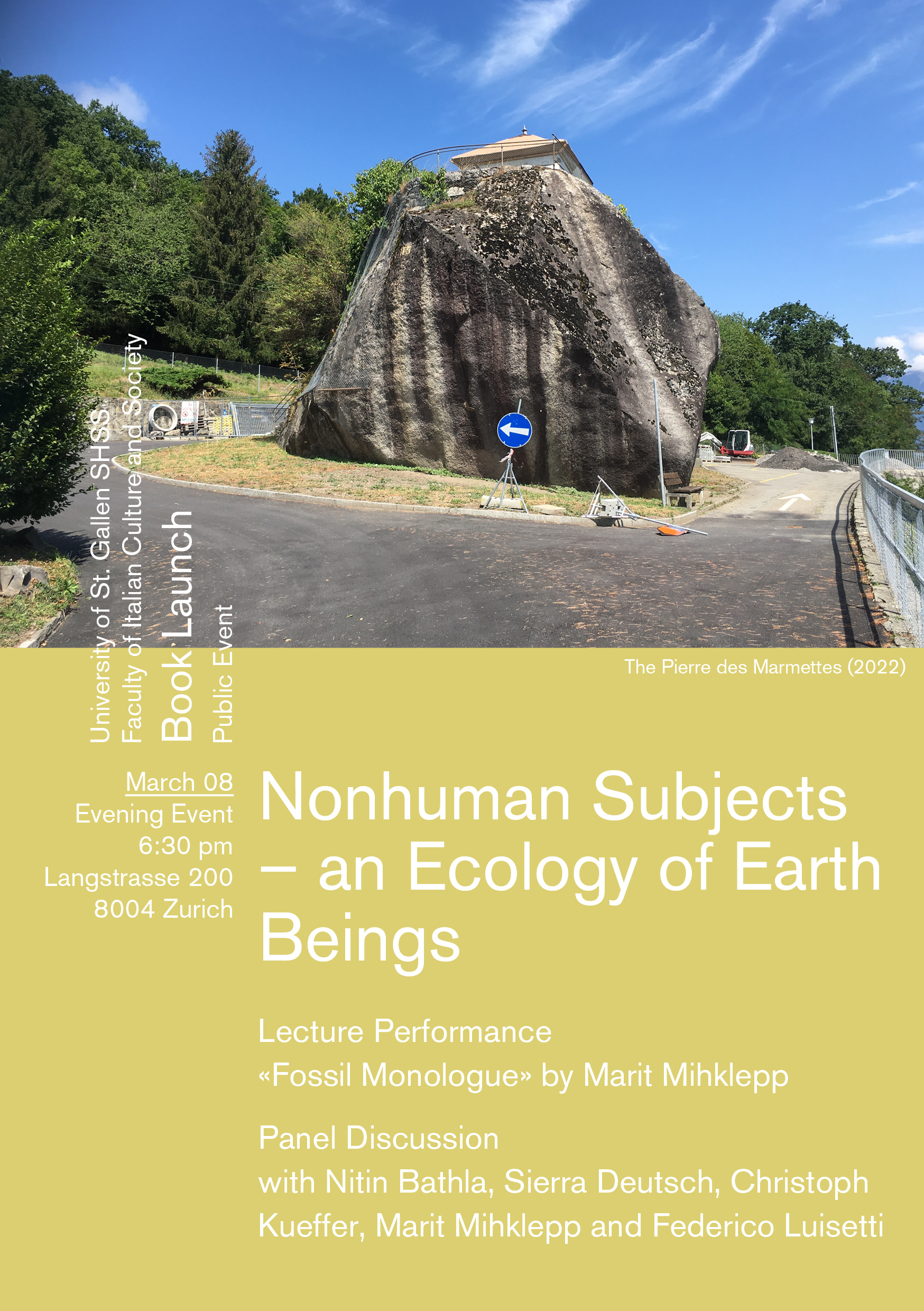
March 8, 2024
6:30 pm
Langstrasse 200
8005 Zürich
Book Launch Event: Nonhuman Subjects – An Ecology of Earth Beings
The launch opens with an artistic lecture performance, followed by a roundtable discussion with guests and the book’s author, who will engage with nonhuman subjectivities from multiple perspectives. The event will close with an informal aperitiv provided by the University of St. Gallen.
With: Nitin Bathla, Sierra Deutsch, Christoph Kueffer, Marit Mihklepp and Federico Luisetti
Nitin Bathla
Nitin Bathla is a lecturer and postdoctoral researcher at the Department of Architecture, ETH Zürich, where he coordinates the doctoral program at the Institute of Landscape and Urban Studies. He lectures on urban studies and political ecology, and his current research focuses on agrarian questions in the planetary age. In his academic practice, Nitin actively combines research with artistic practices of filmmaking, and socially engaged art. His 2020 film Not Just Roads, with Klearjos E. Papanicolaou, premiered at several important film festivals and won the SAH Film Award 2022. ︎︎︎
Sierra Deutsch
Sierra Deutsch is a senior scientist in Space, Nature and Society and group leader of Geographies of Socio-Ecologies and Just Transformations (EcoJusT) in the Geography Institute at the University of Zürich. She has spent her research career expanding her understanding of the shared root causes of environmental breakdown and social injustices from multiple disciplinary lenses, including biology, critical Indigenous studies, sociology, and political ecology. Her academic background is enhanced by her work in industry, government, NGO, and humanitarian capacities, and her experiences from living and working in 7 countries on 5 continents. Currently, her main focus is on engaging her full range of experience to assess and enhance multi-scalar transformative solutions towards more just and sustainable futures. ︎︎︎
Christoph Kueffer
Christoph Kueffer is professor of Urban Ecology at the Landscape Architecture School in Rapperswil (OST - Eastern Switzerland University of Applied Sciences), senior scientist (Privatdozent) at ETH Zurich, an affiliated professor at the Division of Arts and Cultures at Franklin University Switzerland in Lugano, and a researcher at the Institute of Experimental Design and Media Cultures (IXDM) at the FHNW Academy of Art and Design in Basel. He studied Environmental Sciences at ETH Zurich, and completed his PhD in plant ecology and habilitation in plant and global change ecology at the same university. Christoph’s current research focuses on urban ecology, biodiversity conservation in novel and human-dominated ecosystems, global change impacts on island and mountain ecosystems, and environmental humanities. ︎︎︎
Marit Mihklepp
Marit Mihklepp is an Estonian artist who focuses on learning from and relating to the more-than-human bodies and timescales. She studied textile design in Estonian Academy of Arts and interdisciplinary art in Royal Academy of Art, The Hague. Marit is a PhD candidate in University of Art and Design Linz and Zurich University of the Arts, searching for forms of storytelling beyond human, circling around meteorites, myths and measuring. ︎︎︎
6:30 pm
Langstrasse 200
8005 Zürich
Book Launch Event: Nonhuman Subjects – An Ecology of Earth Beings
The launch opens with an artistic lecture performance, followed by a roundtable discussion with guests and the book’s author, who will engage with nonhuman subjectivities from multiple perspectives. The event will close with an informal aperitiv provided by the University of St. Gallen.
With: Nitin Bathla, Sierra Deutsch, Christoph Kueffer, Marit Mihklepp and Federico Luisetti
Nitin Bathla
Nitin Bathla is a lecturer and postdoctoral researcher at the Department of Architecture, ETH Zürich, where he coordinates the doctoral program at the Institute of Landscape and Urban Studies. He lectures on urban studies and political ecology, and his current research focuses on agrarian questions in the planetary age. In his academic practice, Nitin actively combines research with artistic practices of filmmaking, and socially engaged art. His 2020 film Not Just Roads, with Klearjos E. Papanicolaou, premiered at several important film festivals and won the SAH Film Award 2022. ︎︎︎
Sierra Deutsch
Sierra Deutsch is a senior scientist in Space, Nature and Society and group leader of Geographies of Socio-Ecologies and Just Transformations (EcoJusT) in the Geography Institute at the University of Zürich. She has spent her research career expanding her understanding of the shared root causes of environmental breakdown and social injustices from multiple disciplinary lenses, including biology, critical Indigenous studies, sociology, and political ecology. Her academic background is enhanced by her work in industry, government, NGO, and humanitarian capacities, and her experiences from living and working in 7 countries on 5 continents. Currently, her main focus is on engaging her full range of experience to assess and enhance multi-scalar transformative solutions towards more just and sustainable futures. ︎︎︎
Christoph Kueffer
Christoph Kueffer is professor of Urban Ecology at the Landscape Architecture School in Rapperswil (OST - Eastern Switzerland University of Applied Sciences), senior scientist (Privatdozent) at ETH Zurich, an affiliated professor at the Division of Arts and Cultures at Franklin University Switzerland in Lugano, and a researcher at the Institute of Experimental Design and Media Cultures (IXDM) at the FHNW Academy of Art and Design in Basel. He studied Environmental Sciences at ETH Zurich, and completed his PhD in plant ecology and habilitation in plant and global change ecology at the same university. Christoph’s current research focuses on urban ecology, biodiversity conservation in novel and human-dominated ecosystems, global change impacts on island and mountain ecosystems, and environmental humanities. ︎︎︎
Marit Mihklepp
Marit Mihklepp is an Estonian artist who focuses on learning from and relating to the more-than-human bodies and timescales. She studied textile design in Estonian Academy of Arts and interdisciplinary art in Royal Academy of Art, The Hague. Marit is a PhD candidate in University of Art and Design Linz and Zurich University of the Arts, searching for forms of storytelling beyond human, circling around meteorites, myths and measuring. ︎︎︎
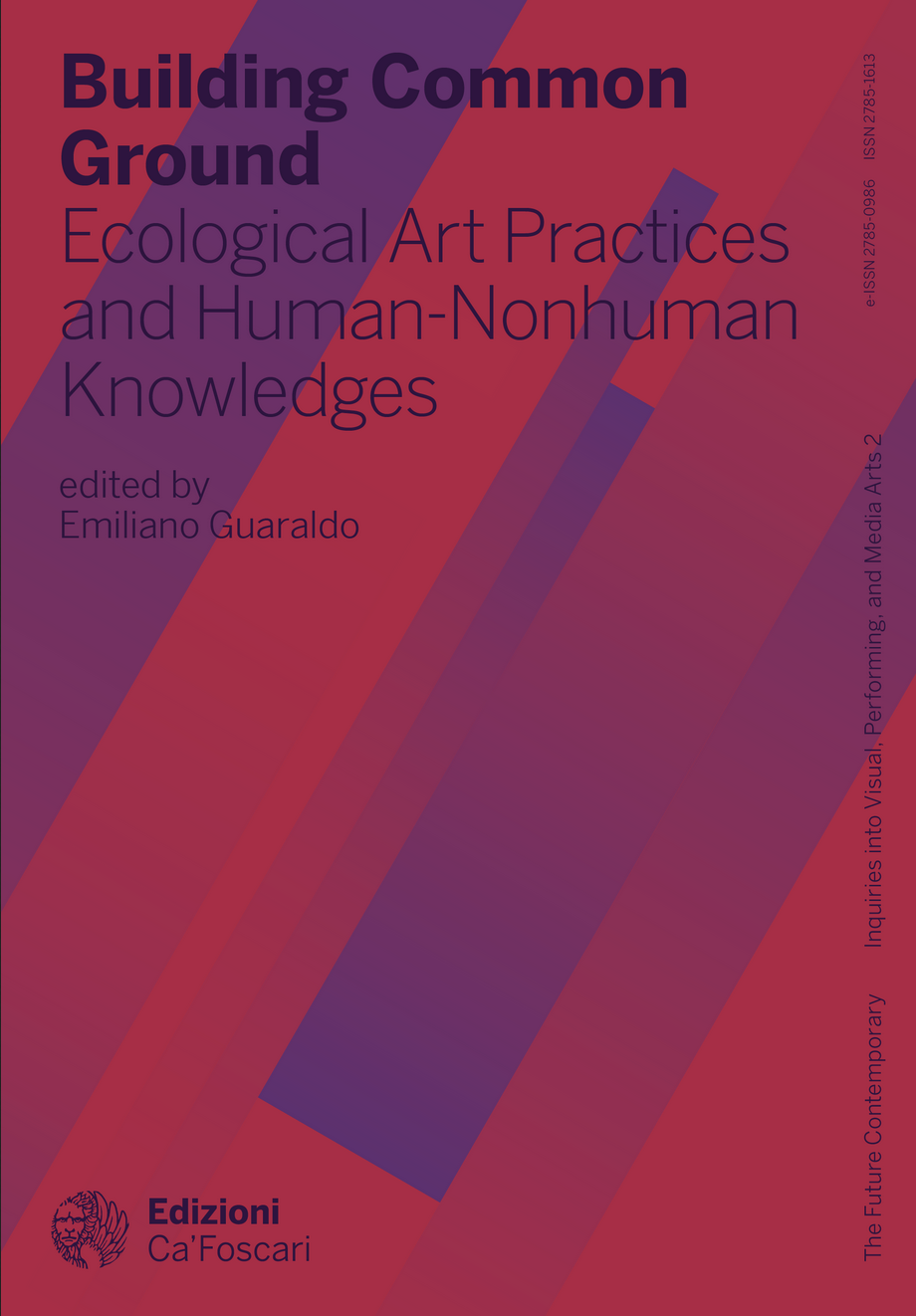
January 16, 2024
Edited volume by Emiliano Guaraldo
This open access volume examines the entanglements between contemporary art practices, ecology, and non-human subjects through contributions from scholars, art writers, critics, artist-researchers and designers. The collected essays reveal contemporary art’s potential to reorient epistemological and ontological coordinates amid ecological and existential crises, questioning human exceptionalism and the exploitative logics of extractivism and planetary industrialization. Central to the volume are issues of environmental degradation and violence, racial capitalism, colonial legacies, the emergence of the Anthropocene, in relation to the diverse terrain of contemporary art practices. Emphasizing the agency of more-than-human collaborators, from animals to microbial ecologies, and from oceans to nuclear waste, these practices expose injustices, reclaim damaged ecosystems, and propose alternative ways of being in and with the planet.
More information and access to the publication here ︎︎︎
Edited volume by Emiliano Guaraldo
Building Common Ground – Ecological Art Practices and Human-Nonhuman Knowledges
This open access volume examines the entanglements between contemporary art practices, ecology, and non-human subjects through contributions from scholars, art writers, critics, artist-researchers and designers. The collected essays reveal contemporary art’s potential to reorient epistemological and ontological coordinates amid ecological and existential crises, questioning human exceptionalism and the exploitative logics of extractivism and planetary industrialization. Central to the volume are issues of environmental degradation and violence, racial capitalism, colonial legacies, the emergence of the Anthropocene, in relation to the diverse terrain of contemporary art practices. Emphasizing the agency of more-than-human collaborators, from animals to microbial ecologies, and from oceans to nuclear waste, these practices expose injustices, reclaim damaged ecosystems, and propose alternative ways of being in and with the planet.
More information and access to the publication here ︎︎︎
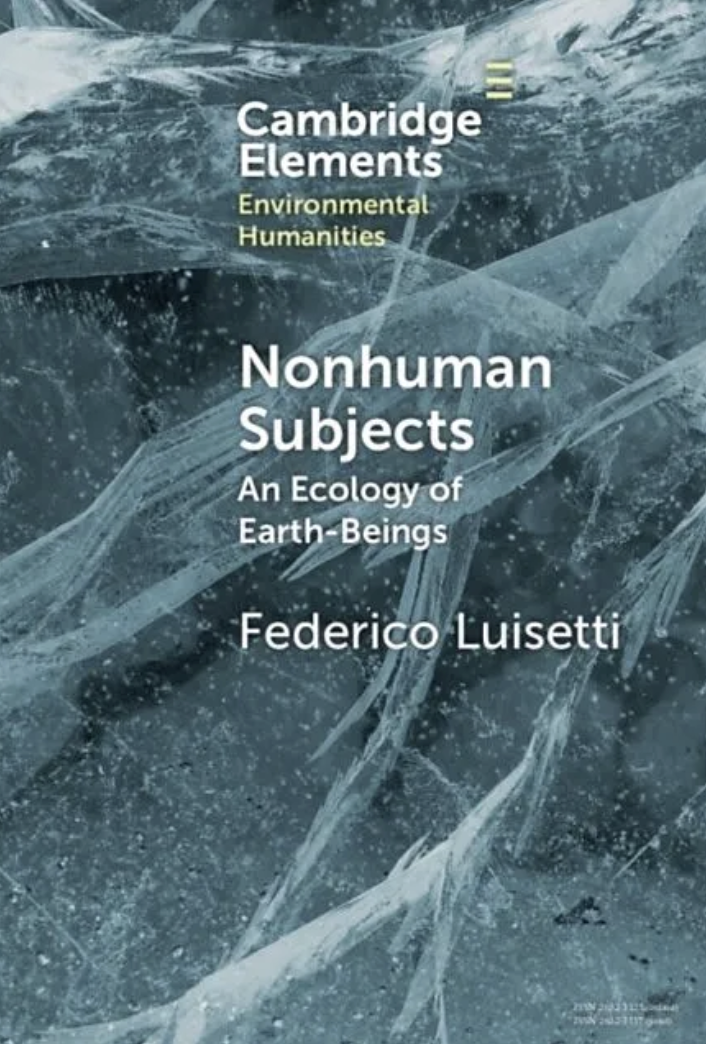
December 18, 2023
Federico Luisetti
Nonhuman Subjects – An Ecology of Earth Beings
The surging wave of indigenous politics, rights of nature, and social movements acting with rocks, rivers, glaciers, and lakes has brought to light an ecology of nonlife. Its protagonists are 'earth-beings,' geobodies that question deep-seated Western notions of personhood. In his new book «Nonhuman Subjects – an Ecology of Earth-Beings», Federico Luisetti writes about Mountains in the Andes, erratic boulders, a landfill in the Swiss Alps, the sacred stones of the Standing Rock Sioux Reservation, and the works of contemporary artists who have engaged with nonhuman subjects.
More information here.︎︎︎
Federico Luisetti
Nonhuman Subjects – An Ecology of Earth Beings
The surging wave of indigenous politics, rights of nature, and social movements acting with rocks, rivers, glaciers, and lakes has brought to light an ecology of nonlife. Its protagonists are 'earth-beings,' geobodies that question deep-seated Western notions of personhood. In his new book «Nonhuman Subjects – an Ecology of Earth-Beings», Federico Luisetti writes about Mountains in the Andes, erratic boulders, a landfill in the Swiss Alps, the sacred stones of the Standing Rock Sioux Reservation, and the works of contemporary artists who have engaged with nonhuman subjects.
More information here.︎︎︎

December 12, 2023
Edited Volume by Daniel A. Finch-Race, Emiliano Guaraldo, Marco Malvestio
Italian Science Fiction and the Environmental Humanities
This volume explores Italian science fiction from the nineteenth century to the twenty-first, covering literary texts, films, music and visual works by figures as diverse as Maria Rosa Cutrufelli, Peter Kolosimo, Primo Levi, Antonio Margheriti, Gilda Musa and Roberto Vacca. It broadens the horizons of both Italian studies and the environmental humanities by addressing a long-neglected genre, and expands our understanding of relations between the ecological, the imaginary and the sociopolitical. The chapters draw on a variety of methodological frameworks, including animal studies, ecocriticism, ecofeminism, eco-media studies, energy humanities and posthumanism. The reader will gain insights into consequential topics such as anthropocentrism/speciesism, ecomodernist thought, environmental justice struggles at the planetary and regional level, non-human and new materialist ontologies, utopian/dystopian philosophies and prospects for transitioning beyond the crisis of petro-modernity through the construction of post-depletion futures.
More Information here ︎︎︎
Edited Volume by Daniel A. Finch-Race, Emiliano Guaraldo, Marco Malvestio
Italian Science Fiction and the Environmental Humanities
This volume explores Italian science fiction from the nineteenth century to the twenty-first, covering literary texts, films, music and visual works by figures as diverse as Maria Rosa Cutrufelli, Peter Kolosimo, Primo Levi, Antonio Margheriti, Gilda Musa and Roberto Vacca. It broadens the horizons of both Italian studies and the environmental humanities by addressing a long-neglected genre, and expands our understanding of relations between the ecological, the imaginary and the sociopolitical. The chapters draw on a variety of methodological frameworks, including animal studies, ecocriticism, ecofeminism, eco-media studies, energy humanities and posthumanism. The reader will gain insights into consequential topics such as anthropocentrism/speciesism, ecomodernist thought, environmental justice struggles at the planetary and regional level, non-human and new materialist ontologies, utopian/dystopian philosophies and prospects for transitioning beyond the crisis of petro-modernity through the construction of post-depletion futures.
More Information here ︎︎︎
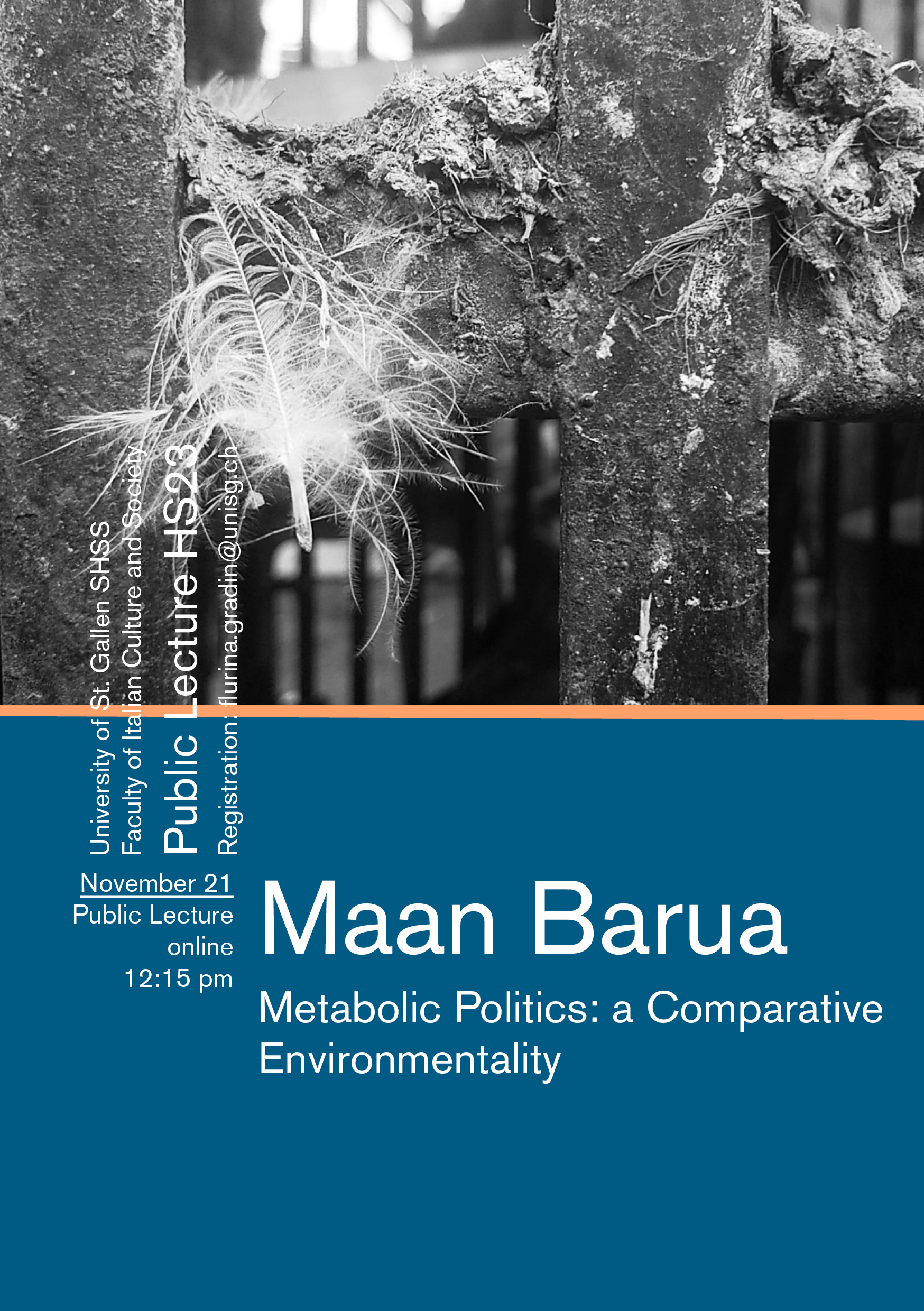
November 21, 2023
Online Event
Guest lecture with Maan Barua at the University of St. Gallen. Registration here
Maan Barua
This talk is about emerging modes of power that shift the focus from discipline and deviant populations, or what Foucault termed biopolitics, to actions and interventions in a living and material milieu. One dimension of this shift is metabolic politics: or how the transformation of materials by living entities and the circulation of substances across bodies and environments become object-targets of regulation and through which contemporary governance unfolds.
The talk first fleshes out metabolic politics via the governance of pollution caused by the poultry industry in the UK. It then turns to a postcolonial context - India - to provincialize metabolic politics and to foreground how this dispositif of power is neither hegemonic nor the same everywhere. The talk summarizes key features of a metabolic politics that is attentive to difference and history, and discusses what a focus on the metabolic tells us about the economization and governance of life
Maan Barua works on the ontologies, economies and politics of the living and material world. His work is at the intersections of posthumanism, political economy and postcolonial thought. His current research spans four thematic areas: urban ecologies and urban surrounds, biocapital and postcolonial environments. Maan is the PI on an ERC Horizon 2020 Starting Grant Urban Ecologies, and is a University Lecturer in Human Geography at the University of Cambridge. His book Lively Cities: Reconfiguring Urban Ecology was published in 2023 (Minnesota University Press), and a second monograph, Plantation Worlds will be published by Duke University Press in fall 2024.
Online Event
Guest lecture with Maan Barua at the University of St. Gallen. Registration here
Maan Barua
Metabolic Politics: a Comparative Environmentality
This talk is about emerging modes of power that shift the focus from discipline and deviant populations, or what Foucault termed biopolitics, to actions and interventions in a living and material milieu. One dimension of this shift is metabolic politics: or how the transformation of materials by living entities and the circulation of substances across bodies and environments become object-targets of regulation and through which contemporary governance unfolds.
The talk first fleshes out metabolic politics via the governance of pollution caused by the poultry industry in the UK. It then turns to a postcolonial context - India - to provincialize metabolic politics and to foreground how this dispositif of power is neither hegemonic nor the same everywhere. The talk summarizes key features of a metabolic politics that is attentive to difference and history, and discusses what a focus on the metabolic tells us about the economization and governance of life
Maan Barua works on the ontologies, economies and politics of the living and material world. His work is at the intersections of posthumanism, political economy and postcolonial thought. His current research spans four thematic areas: urban ecologies and urban surrounds, biocapital and postcolonial environments. Maan is the PI on an ERC Horizon 2020 Starting Grant Urban Ecologies, and is a University Lecturer in Human Geography at the University of Cambridge. His book Lively Cities: Reconfiguring Urban Ecology was published in 2023 (Minnesota University Press), and a second monograph, Plantation Worlds will be published by Duke University Press in fall 2024.
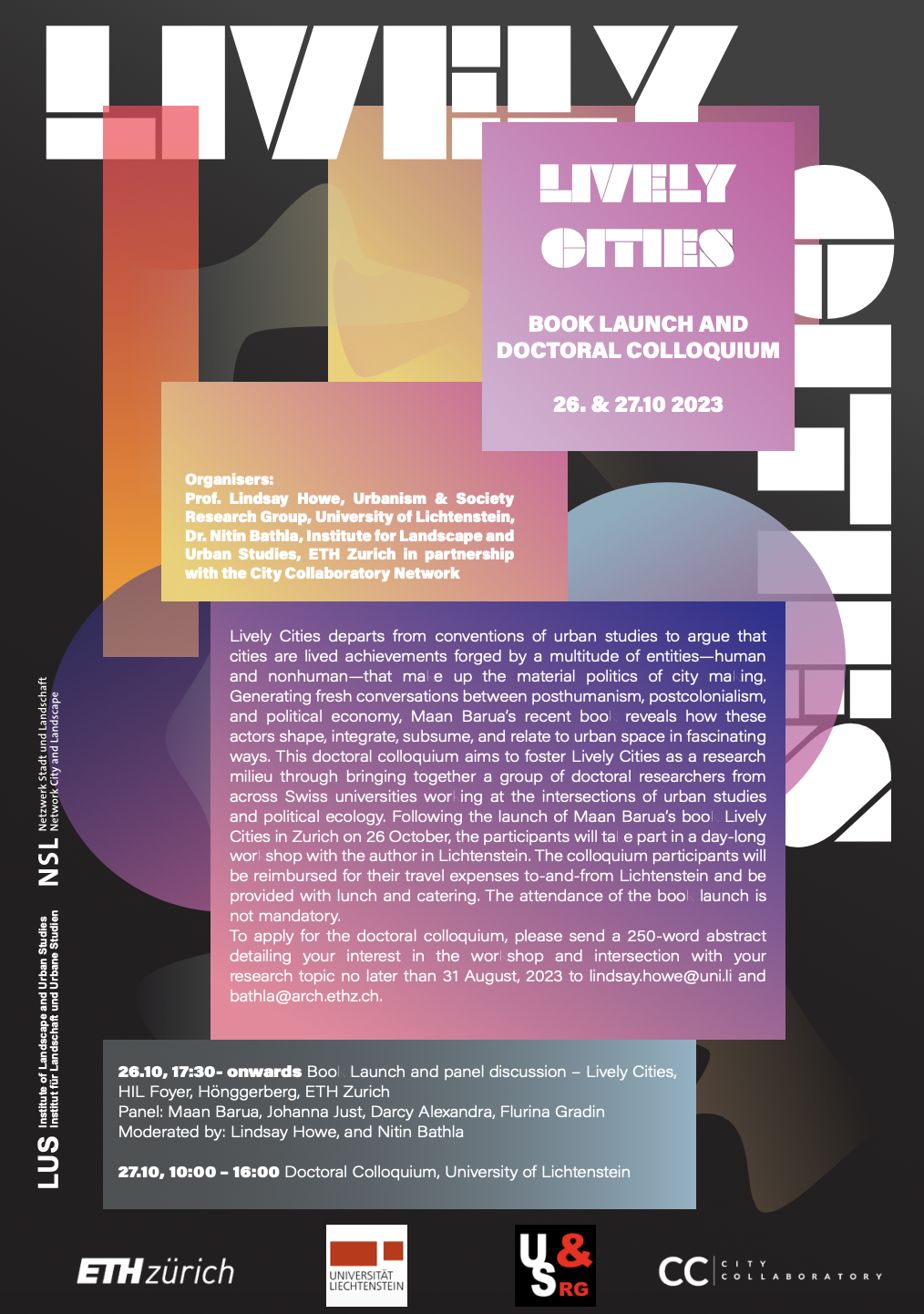
October 26, 2023
Onsite Event at ETH Zurich, HIL E 71.1
5 to 7 pm
Book launch and panel discussion
Lively Cities departs from conventions of urban studies to argue that cities are lived achievments forged by a multitude of entities – human and honhuman – that make up the material politics of city making. Generating fresh conversations petween posthumanisn, postcolonialism, and political economy, Maan Barua`s recent book reveals how these actors shape, integrate, subsume, and relate to urban space in fascinating ways. The book launch event in Zurich will be accompagnied by a panel discussion. More information here
Panel: Darcy Alexandra (University of Bern) Maan Barua (University of Cambridge), Johanna Just (ETH Zurich), Flurina Gradin (University of St. Gallen). Moderated by Lindsay Howe and Nitin Bathla (ETH Zurich).
Onsite Event at ETH Zurich, HIL E 71.1
5 to 7 pm
Book launch and panel discussion
Lively Cities
Lively Cities departs from conventions of urban studies to argue that cities are lived achievments forged by a multitude of entities – human and honhuman – that make up the material politics of city making. Generating fresh conversations petween posthumanisn, postcolonialism, and political economy, Maan Barua`s recent book reveals how these actors shape, integrate, subsume, and relate to urban space in fascinating ways. The book launch event in Zurich will be accompagnied by a panel discussion. More information here
Panel: Darcy Alexandra (University of Bern) Maan Barua (University of Cambridge), Johanna Just (ETH Zurich), Flurina Gradin (University of St. Gallen). Moderated by Lindsay Howe and Nitin Bathla (ETH Zurich).
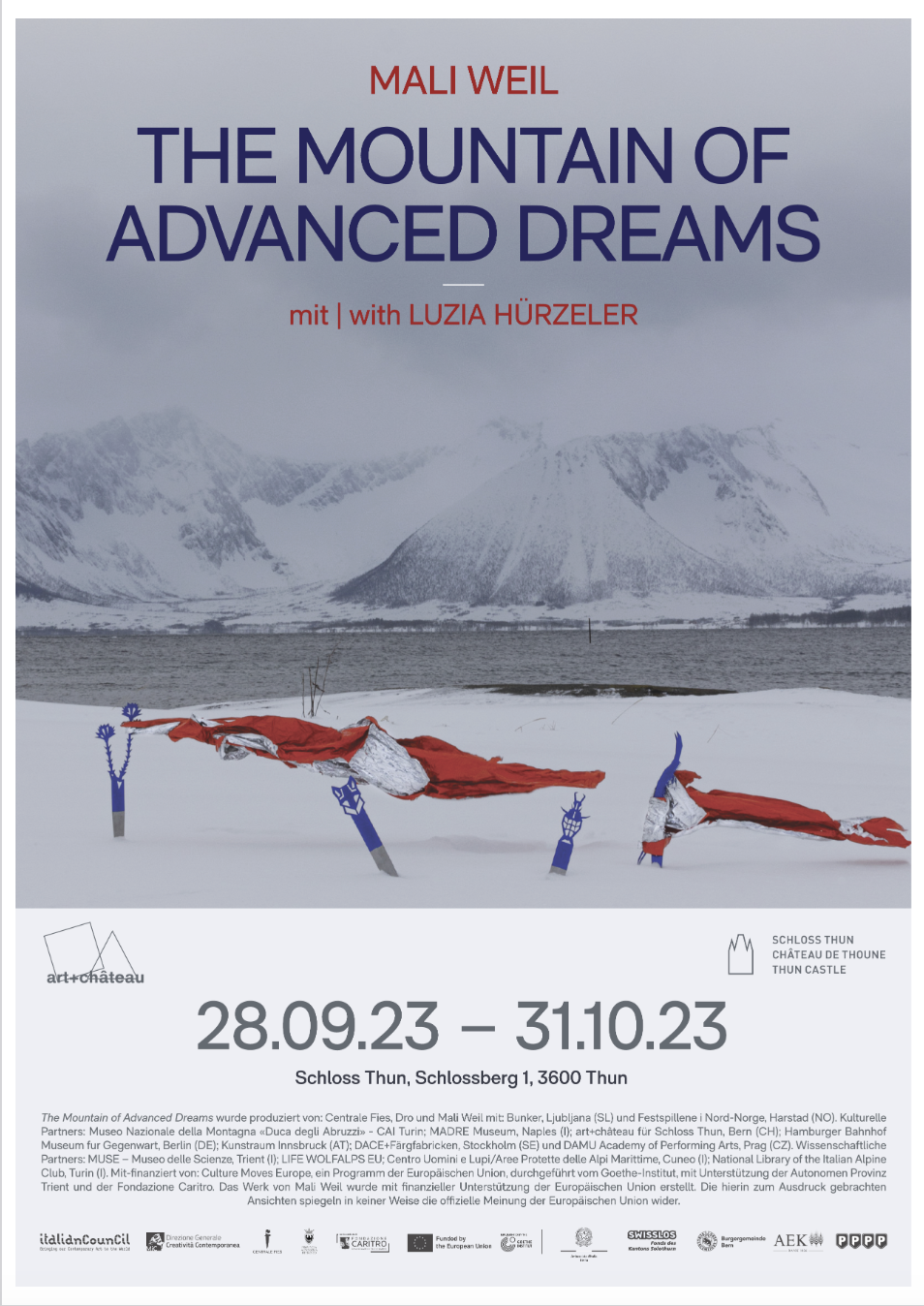
September 28, 2023
Onsite Event at Thun Castle, Thun
Switzerland
Conference and art exhibition about interspecies diplomacy and werewolfish studies.
On the opening day, as an integral part of her artistic project, Mali Weil will moderate a transdisciplinary conference attended by Swiss and international guests. With Gabriella Calchi Novati, Silvia Mignano, Federico Luisetti and other guests. More Information here
Onsite Event at Thun Castle, Thun
Switzerland
Conference and art exhibition about interspecies diplomacy and werewolfish studies.
Mali Weil – the mountain of advanced dreams (with Luzia Hürzeler)
On the opening day, as an integral part of her artistic project, Mali Weil will moderate a transdisciplinary conference attended by Swiss and international guests. With Gabriella Calchi Novati, Silvia Mignano, Federico Luisetti and other guests. More Information here
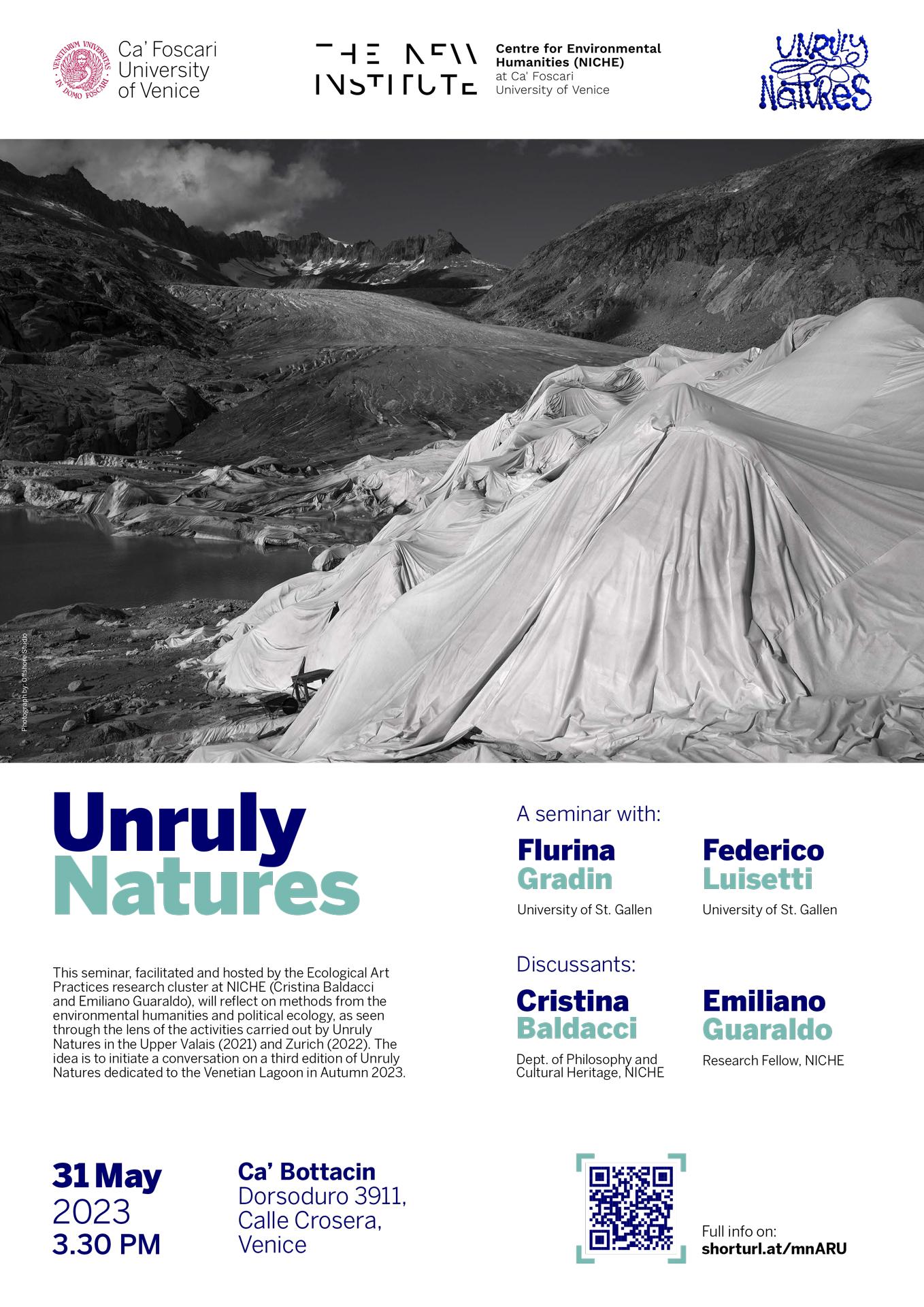
May 31, 2023
Onsite Event
Seminar at the Ca' Foscari University of Venice organized by Cristina Baldacci and Emiliano Guaraldo. With Federico Luisetti and Flurina Gradin. More Information here
This seminar, facilitated and hosted by the Ecological Art Practices research cluster at THE NEW INSTITUTE Centre for Environmental Humanities (NICHE), will reflect on methods from the environmental humanities and political ecology, as seen through the lens of the activities carried out by Unruly Natures in the Upper Valais (2021) and Zurich (2022). The idea is to initiate a conversation on a third edition of Unruly Natures dedicated to the Venetian Lagoon in Autumn 2023.
Onsite Event
Seminar at the Ca' Foscari University of Venice organized by Cristina Baldacci and Emiliano Guaraldo. With Federico Luisetti and Flurina Gradin. More Information here
Unruly Natures
This seminar, facilitated and hosted by the Ecological Art Practices research cluster at THE NEW INSTITUTE Centre for Environmental Humanities (NICHE), will reflect on methods from the environmental humanities and political ecology, as seen through the lens of the activities carried out by Unruly Natures in the Upper Valais (2021) and Zurich (2022). The idea is to initiate a conversation on a third edition of Unruly Natures dedicated to the Venetian Lagoon in Autumn 2023.
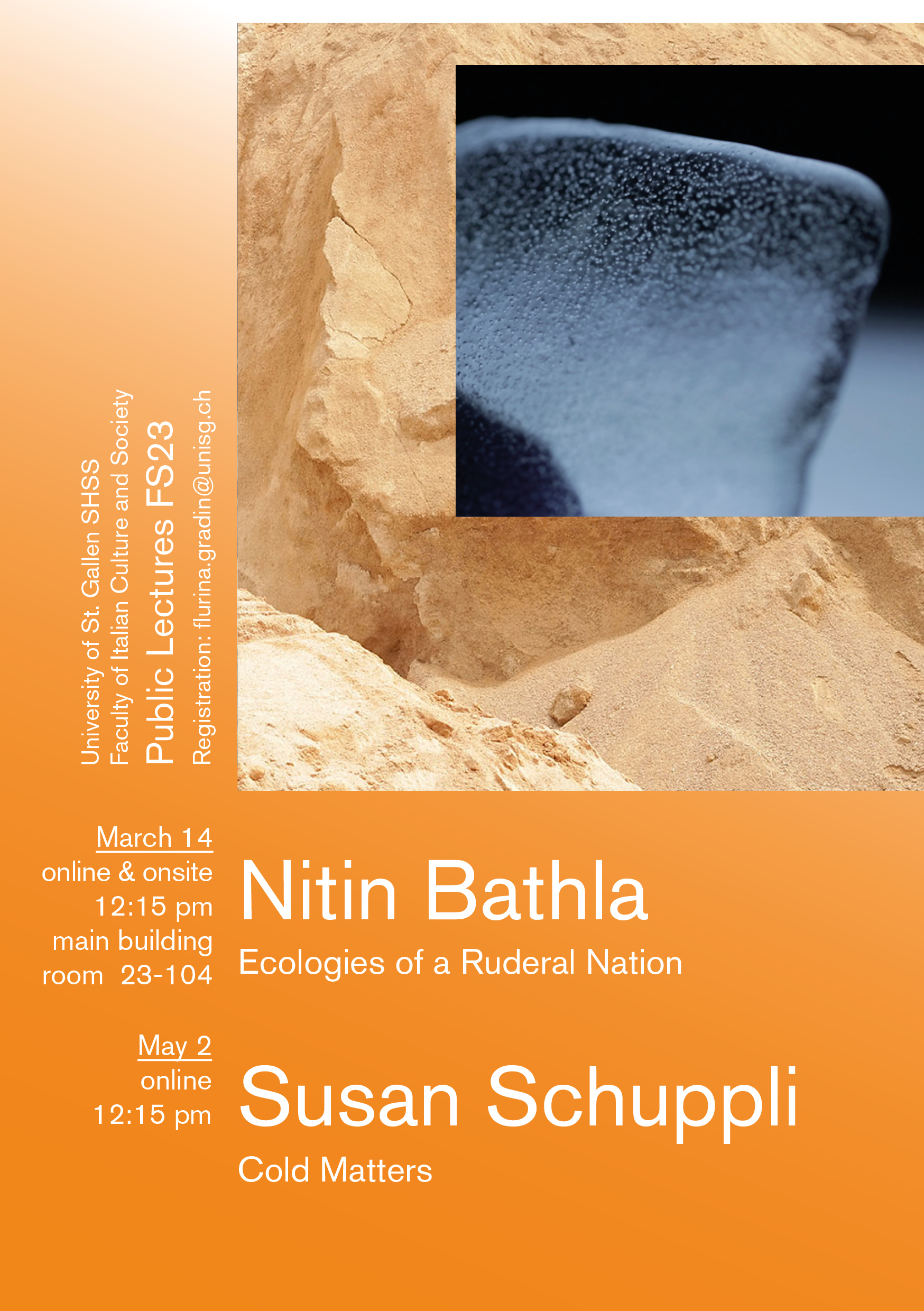
March 14, 2023
Online and Onsite Event
Guest lecture with Nitin Bathla at the University of St. Gallen. Registration here
The Indian countryside has been subject to such an extensive process of state-making in the last two decades that the spatial binaries of urban and rural seem to have sublated into the ruderal. New highway and infrastructure corridors are being laid out across the country at an unprecedented rate bringing extended urbanization into previously bypassed zones of nature conservation and rural autonomy.
This is not only giving rise to uneven development but also to new ecologies that refract colonial ideas of waste and improvement, making commons and public lands available to processes of global value creation. However, these ruderal landscapes also become sites where counter-ecologies are produced and contested. This lecture examines the incipient environmental imaginaries and ecologies under ruderal nation building.
Nitin Bathla is a lecturer and postdoctoral researcher at the Department of Architecture, ETH Zürich, where he coordinates the doctoral program at the Institute of Landscape and Urban Studies. He lectures on urban studies, and political ecology, and his current research focuses on agrarian questions under the planetary age. In his academic practice, Nitin actively combines research with artistic practices of filmmaking, and socially engaged art. His 2020 film Not Just Roads with Klearjos E. Papanicolaou premiered at several important film festivals and won the SAH Film Award 2022.
Online and Onsite Event
Guest lecture with Nitin Bathla at the University of St. Gallen. Registration here
Ecologies of a Ruderal Nation
The Indian countryside has been subject to such an extensive process of state-making in the last two decades that the spatial binaries of urban and rural seem to have sublated into the ruderal. New highway and infrastructure corridors are being laid out across the country at an unprecedented rate bringing extended urbanization into previously bypassed zones of nature conservation and rural autonomy.
This is not only giving rise to uneven development but also to new ecologies that refract colonial ideas of waste and improvement, making commons and public lands available to processes of global value creation. However, these ruderal landscapes also become sites where counter-ecologies are produced and contested. This lecture examines the incipient environmental imaginaries and ecologies under ruderal nation building.
Nitin Bathla is a lecturer and postdoctoral researcher at the Department of Architecture, ETH Zürich, where he coordinates the doctoral program at the Institute of Landscape and Urban Studies. He lectures on urban studies, and political ecology, and his current research focuses on agrarian questions under the planetary age. In his academic practice, Nitin actively combines research with artistic practices of filmmaking, and socially engaged art. His 2020 film Not Just Roads with Klearjos E. Papanicolaou premiered at several important film festivals and won the SAH Film Award 2022.
May 2, 2023
Online Event
Guest lecture with Susan Schuppli at the University of St. Gallen. Registration here
Cold Matters
Environmental systems and the transformations brought about by global warming are also generating new forms of evidence; creating, in effect, a planetary archive of material witnesses. In this lecture Susan Schuppli expands upon ideas developed in her concept of the “material witness".
Much of this work has been developed through the multi-year “Learning from Ice” Project, which reflects upon the ways in which the different knowledge practices mediated by ice as well as the differential experiences of cold are entangled with legal questions, human rights violations but also claims for social and environmental justice.
Susan Schuppli is Director of the Centre for Research Architecture, Goldsmiths University of London, where she is also an affiliate artist-researcher and Board Chair of Forensic Architecture. Her current work focuses on learning from ice and the politics of cold, and includes a series of documentary film projects: Ice Cores (2019), Artic Archipelago (2021), Not Planet Earth (2021), Cold Cases (2021-22), Gondwana (2022), and a COP26 Creative Commission (Listening to Ice) sponsored by the British Council, which involved scientific and community-based work at Drang Drung Glacier in Ladakh, India. Her first vinyl LP "ICE RECORDS" was released by BEK Norway last year. Schuppli has published widely within the context of media and politics, and is author of the book, Material Witness published by MIT Press in 2020.
Online Event
Guest lecture with Susan Schuppli at the University of St. Gallen. Registration here
Cold Matters
Environmental systems and the transformations brought about by global warming are also generating new forms of evidence; creating, in effect, a planetary archive of material witnesses. In this lecture Susan Schuppli expands upon ideas developed in her concept of the “material witness".
Much of this work has been developed through the multi-year “Learning from Ice” Project, which reflects upon the ways in which the different knowledge practices mediated by ice as well as the differential experiences of cold are entangled with legal questions, human rights violations but also claims for social and environmental justice.
Susan Schuppli is Director of the Centre for Research Architecture, Goldsmiths University of London, where she is also an affiliate artist-researcher and Board Chair of Forensic Architecture. Her current work focuses on learning from ice and the politics of cold, and includes a series of documentary film projects: Ice Cores (2019), Artic Archipelago (2021), Not Planet Earth (2021), Cold Cases (2021-22), Gondwana (2022), and a COP26 Creative Commission (Listening to Ice) sponsored by the British Council, which involved scientific and community-based work at Drang Drung Glacier in Ladakh, India. Her first vinyl LP "ICE RECORDS" was released by BEK Norway last year. Schuppli has published widely within the context of media and politics, and is author of the book, Material Witness published by MIT Press in 2020.
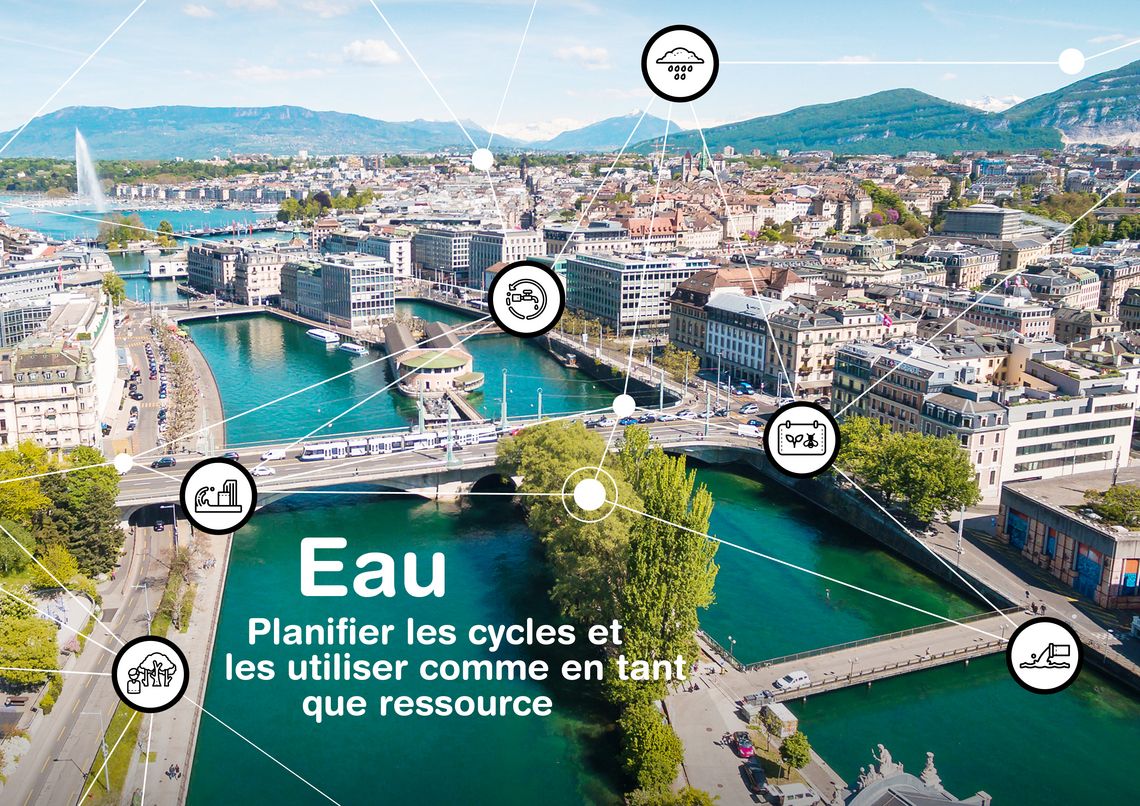
April 21, 2023
Online Event
2 pm
Talks and panel discussion at the ZHAW conference «Urban und Grün» on Wasser – Kreisläufe planen und als Ressource nutzen» for professionals. Information here, registration here
The format engages with refreshing and highly transdisciplinary projects on the topic of water in urban spaces as a multilayered cultural resource. Experts from different fields will present their work. The presentations will be followed by a panel discussion.
With Jean Daniel Blanc: «Into the Wild? The River Sihl and its Landscape Through Time»; Riikka Tauriainen: «Ecotone Encounters»; Ludwig Berger: «Acoustique Aquatique – Sounding Zurich’s Bodies of Water»; Emma-Louise Lavigne: «L`Appel du Rhône – Building a Social, Transnational and Radical Organisation of the Watershed». Moderation by Flurina Gradin.
Online Event
2 pm
Fluid Urban Imaginaries – Water as a Cultural Resource
Talks and panel discussion at the ZHAW conference «Urban und Grün» on Wasser – Kreisläufe planen und als Ressource nutzen» for professionals. Information here, registration here
The format engages with refreshing and highly transdisciplinary projects on the topic of water in urban spaces as a multilayered cultural resource. Experts from different fields will present their work. The presentations will be followed by a panel discussion.
With Jean Daniel Blanc: «Into the Wild? The River Sihl and its Landscape Through Time»; Riikka Tauriainen: «Ecotone Encounters»; Ludwig Berger: «Acoustique Aquatique – Sounding Zurich’s Bodies of Water»; Emma-Louise Lavigne: «L`Appel du Rhône – Building a Social, Transnational and Radical Organisation of the Watershed». Moderation by Flurina Gradin.
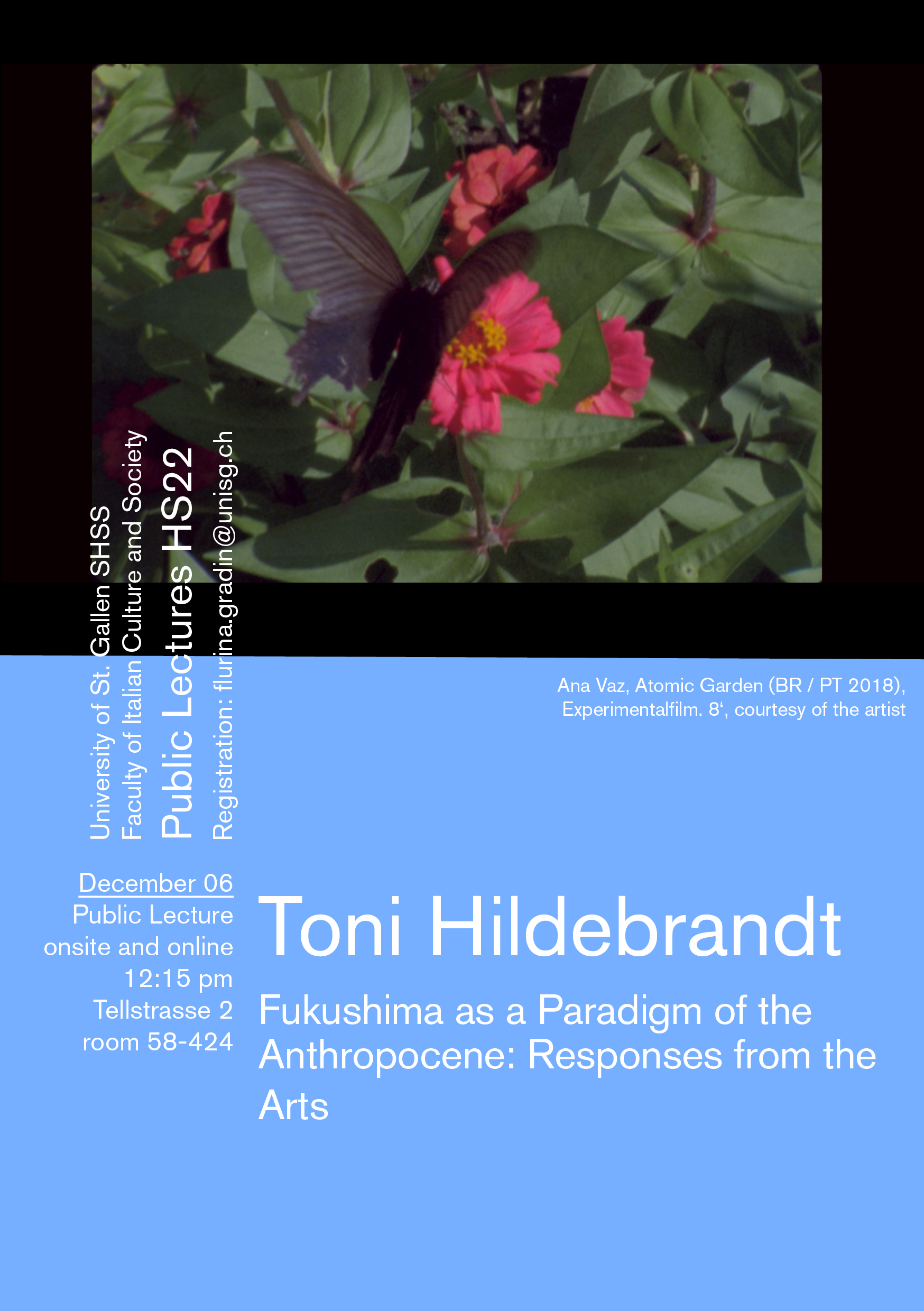
December 6, 2022
Online and on site Event
12:15 pm
Guest Lecture with Toni Hildebrandt at the University of St. Gallen. Registration here
The talk is part of the research project (Post-)apocalyptic Imaginations: Representations of Nuclear Catastrophes in Art and Film 1945-2011 that stretches from the atomic bombings of Hiroshima and Nagasaki in 1945 to the Fukushima nuclear disaster in 2011. The term „Hiroshima“ referred in paradigmatic films such as Hiroshima mon amour (1959) to problems of cultural memory, the archive, the witness, and human experience. In similar ways, „Fukushima“ points to epistemic shifts that are crucial to the understanding of the „Nuclear Anthropocene“.
The lecture will examine three responses to the Fukushima disaster from the arts. Filmmaker Ana Vaz, artist and theatre director Akira Takayama, and Ikebana master Atsunobu Katagiri react to the catastrophe with works that decentralize the human, paying attention to flowers, fireworks, gardens, insects and farm animals. In these tales of survival, the human is marginalized or temporary/spatially subtracted, to re-enter the world with a new ethical consciousness and awareness.
Toni Hildebrandt is the coordinator of the SNSF Sinergia project „Mediating the Ecological Imperative“ (in collaboration with UNAM Mexico City). After receiving his PhD in Art History at the University of Basel in 2014, he has been working at the Department of Modern and Contemporary Art History at University of Bern. Among his recent publications are: PPPP: Pier Paolo Pasolini Philosopher (a volume co-edited with with Giovanbattista Tusa) and the essay „Post-Apocalyptic Amazement: Aesthetics and Historical Consciousness in the Natural Contract“. Toni Hildebrandt has just returned from a visiting appointment as guest researcher at the University of Tokyo and RAM/Tokyo University of the Arts.
Online and on site Event
12:15 pm
Fukushima as a Paradigm of the Anthropocene: Responses from the Arts
Guest Lecture with Toni Hildebrandt at the University of St. Gallen. Registration here
The talk is part of the research project (Post-)apocalyptic Imaginations: Representations of Nuclear Catastrophes in Art and Film 1945-2011 that stretches from the atomic bombings of Hiroshima and Nagasaki in 1945 to the Fukushima nuclear disaster in 2011. The term „Hiroshima“ referred in paradigmatic films such as Hiroshima mon amour (1959) to problems of cultural memory, the archive, the witness, and human experience. In similar ways, „Fukushima“ points to epistemic shifts that are crucial to the understanding of the „Nuclear Anthropocene“.
The lecture will examine three responses to the Fukushima disaster from the arts. Filmmaker Ana Vaz, artist and theatre director Akira Takayama, and Ikebana master Atsunobu Katagiri react to the catastrophe with works that decentralize the human, paying attention to flowers, fireworks, gardens, insects and farm animals. In these tales of survival, the human is marginalized or temporary/spatially subtracted, to re-enter the world with a new ethical consciousness and awareness.
Toni Hildebrandt is the coordinator of the SNSF Sinergia project „Mediating the Ecological Imperative“ (in collaboration with UNAM Mexico City). After receiving his PhD in Art History at the University of Basel in 2014, he has been working at the Department of Modern and Contemporary Art History at University of Bern. Among his recent publications are: PPPP: Pier Paolo Pasolini Philosopher (a volume co-edited with with Giovanbattista Tusa) and the essay „Post-Apocalyptic Amazement: Aesthetics and Historical Consciousness in the Natural Contract“. Toni Hildebrandt has just returned from a visiting appointment as guest researcher at the University of Tokyo and RAM/Tokyo University of the Arts.

November 26, 2022
Université de Fribourg, Département de Philosophie – Research Seminar 2022
Talks by Federico Luisetti and other keynote speakers at the Kunsthalle Friart, Fribourg. More Information here
For centuries, artists have been keen to paint from nature. What remains of this aesthetic project in a world where nature is revealed as already fully “anthropized”? What is left of nature, when it has lost the status of the Great Outdoors? Faced with climate emergency, other politics – but also: aesthetics – of nature become urgent. How to conceive a nature that is no longer located beyond us, but that permeates us? How to think, in return, a nature already marked by recursive processes, in short: by technique ? Perhaps nature after nature never was but that: a nature that discovers itself as having always been second nature. A nature as art.
Invited speakers:
Sabeth Buchmann (Universität Wien)
Howard Caygill (Kingston University London)
Toni Hildebrandt (Universität Bern)
Federico Luisetti (Universität St. Gallen)
Pietro Montani (Sapienza Roma)
Pauline Nadrigny (Université Paris I)
Université de Fribourg, Département de Philosophie – Research Seminar 2022
Aesthetics & Critique V – After Nature / Après Nature / Nach der Natur
Talks by Federico Luisetti and other keynote speakers at the Kunsthalle Friart, Fribourg. More Information here
For centuries, artists have been keen to paint from nature. What remains of this aesthetic project in a world where nature is revealed as already fully “anthropized”? What is left of nature, when it has lost the status of the Great Outdoors? Faced with climate emergency, other politics – but also: aesthetics – of nature become urgent. How to conceive a nature that is no longer located beyond us, but that permeates us? How to think, in return, a nature already marked by recursive processes, in short: by technique ? Perhaps nature after nature never was but that: a nature that discovers itself as having always been second nature. A nature as art.
Invited speakers:
Sabeth Buchmann (Universität Wien)
Howard Caygill (Kingston University London)
Toni Hildebrandt (Universität Bern)
Federico Luisetti (Universität St. Gallen)
Pietro Montani (Sapienza Roma)
Pauline Nadrigny (Université Paris I)
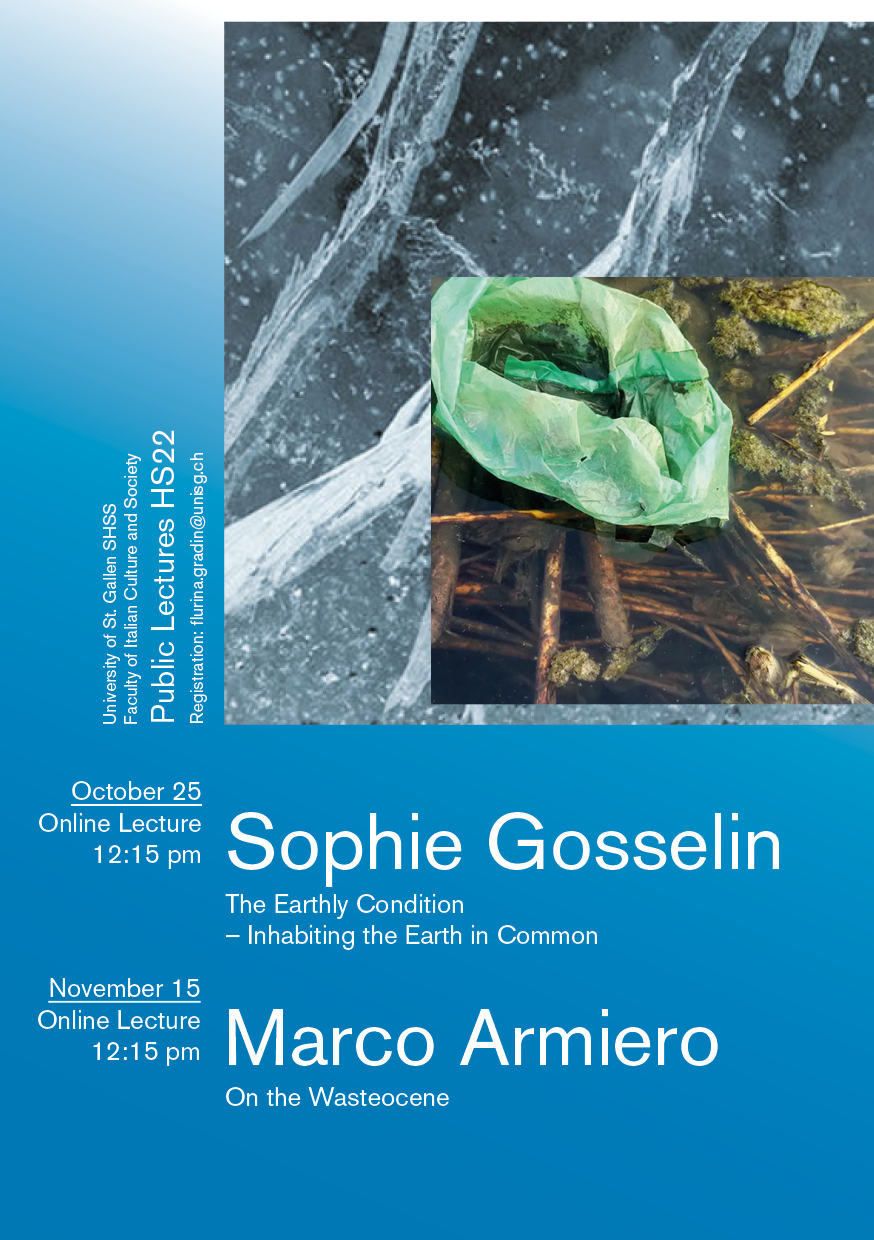
October 25, 2022
Online Event
Guest Lecture with Sophie Gosselin at the University of St. Gallen. Registration here
The space-time of politics is changing: the Earth and the multiplicity of beings that compose it are bursting into human affairs by reacting to the continuous assaults of a modernization front led by the State-Capital. The modern condition, driven by anthropocentric rights and political measures governed by the systematic exploitation of natural resources and the putting to work of all beings, is collapsing.
But what about opening another path: to think and live in our earthly condition? In this guest lecture, Sophie Gosselin will be talking about the shifting political landscape of modernity where the individual becomes a relational person, citizen and representative democracy becomes a multispecific assembly of inhabitants, national peoples are transformed into river peoples, mountain peoples or archipelago peoples, and state sovereignty is shared to take into account decolonial, interspecific and ecofeminist perspectives. These reinventions engage us to re-inhabit our relationships, our affects, our imaginations in order to live an Earth in common: an Earth made of many worlds.
Sophie Gosselin is a philosopher based in France. She is the co-author with David gé Bartoli of La Condition terrestre (Seuil, 2022) and Le Toucher du monde, techniques du naturer (Editions Dehors, 2019). She is a founding member of the online review Terrestres and of the University for the Earth in Tours.
Online Event
The Earthly Condition – Inhabiting the Earth in Common
Guest Lecture with Sophie Gosselin at the University of St. Gallen. Registration here
The space-time of politics is changing: the Earth and the multiplicity of beings that compose it are bursting into human affairs by reacting to the continuous assaults of a modernization front led by the State-Capital. The modern condition, driven by anthropocentric rights and political measures governed by the systematic exploitation of natural resources and the putting to work of all beings, is collapsing.
But what about opening another path: to think and live in our earthly condition? In this guest lecture, Sophie Gosselin will be talking about the shifting political landscape of modernity where the individual becomes a relational person, citizen and representative democracy becomes a multispecific assembly of inhabitants, national peoples are transformed into river peoples, mountain peoples or archipelago peoples, and state sovereignty is shared to take into account decolonial, interspecific and ecofeminist perspectives. These reinventions engage us to re-inhabit our relationships, our affects, our imaginations in order to live an Earth in common: an Earth made of many worlds.
Sophie Gosselin is a philosopher based in France. She is the co-author with David gé Bartoli of La Condition terrestre (Seuil, 2022) and Le Toucher du monde, techniques du naturer (Editions Dehors, 2019). She is a founding member of the online review Terrestres and of the University for the Earth in Tours.
November 15, 2022
Online Event
On the Wasteocene
Guest Lecture with Marco Armiero at the University of St. Gallen. Registration here
Humans may live in the Anthropocene, but this does not affect all in the same way. How would the Anthropocene look if, instead of searching its traces in the geosphere, researchers would look for them in the organosphere, in the ecologies of humans in their entanglements with the environment? In this guest lecture, Marco Armiero will invite us to take a closer look at this embodied stratigraphy of power and toxicity. More than the Anthropocene, we will start a dialogue to discover the Wasteocene.
The imposition of wasting relationships on subaltern human and more-than-human communities implies the construction of toxic ecologies made of contaminating substances and narratives. While official accounts have systematically erased any trace of those wasting relationships, another kind of narrative has been written in flesh, blood, and cells. Traveling between Naples (Italy) and Agbogbloshie (Ghana), science fiction and epidemic outbreaks, the talk will take us into the bowels of the Wasteocene, but it will also indicate the commoning practices which are dismantling it.
Marco Armiero is the director of the Environmental Humanities Laboratory at the Royal Institute of Technology (KTH) in Stockholm and current president of the European Society for Environmental History. He is one of the founders of the field of environmental history in Italy. Among his publications: Wasteocene. Stories from the Global Dump (Cambridge University Press, 2021) and, with Gregg Mitman and Robert S. Emmett, Future Remains. A Cabinet of Curiosities for the Anthropocene (University of Chicago Press, 2018).
Online Event
On the Wasteocene
Guest Lecture with Marco Armiero at the University of St. Gallen. Registration here
Humans may live in the Anthropocene, but this does not affect all in the same way. How would the Anthropocene look if, instead of searching its traces in the geosphere, researchers would look for them in the organosphere, in the ecologies of humans in their entanglements with the environment? In this guest lecture, Marco Armiero will invite us to take a closer look at this embodied stratigraphy of power and toxicity. More than the Anthropocene, we will start a dialogue to discover the Wasteocene.
The imposition of wasting relationships on subaltern human and more-than-human communities implies the construction of toxic ecologies made of contaminating substances and narratives. While official accounts have systematically erased any trace of those wasting relationships, another kind of narrative has been written in flesh, blood, and cells. Traveling between Naples (Italy) and Agbogbloshie (Ghana), science fiction and epidemic outbreaks, the talk will take us into the bowels of the Wasteocene, but it will also indicate the commoning practices which are dismantling it.
Marco Armiero is the director of the Environmental Humanities Laboratory at the Royal Institute of Technology (KTH) in Stockholm and current president of the European Society for Environmental History. He is one of the founders of the field of environmental history in Italy. Among his publications: Wasteocene. Stories from the Global Dump (Cambridge University Press, 2021) and, with Gregg Mitman and Robert S. Emmett, Future Remains. A Cabinet of Curiosities for the Anthropocene (University of Chicago Press, 2018).

October 27/28, 2022
Counterparts – Swiss Design Network Research Summit 2022
Panel Contribution by Flurina Gradin at the Zurich University of the Arts. More Information here
The contribution within the framework of the SDN research summit offers the opportunity to relate recent research activities in the Upper Valais and in urban biotopes and to discuss them from a design perspective. In particular, the research project and the two field trips will be the framework to explore the following question: What contribution can design practices make to further developing existing ways of knowing and acting in relation to earth-beings and the - probably - inadequate „notions of relationship“ we have with them? It will be discussed if and to what extent encounters and experiences can be designed as transformative learning processes that initiate expanded forms of political appreciation and proximity towards other-than-human entities.
Counterparts – Swiss Design Network Research Summit 2022
Infrapolitical Natures: Designing Notions of Relationship
Panel Contribution by Flurina Gradin at the Zurich University of the Arts. More Information here
The contribution within the framework of the SDN research summit offers the opportunity to relate recent research activities in the Upper Valais and in urban biotopes and to discuss them from a design perspective. In particular, the research project and the two field trips will be the framework to explore the following question: What contribution can design practices make to further developing existing ways of knowing and acting in relation to earth-beings and the - probably - inadequate „notions of relationship“ we have with them? It will be discussed if and to what extent encounters and experiences can be designed as transformative learning processes that initiate expanded forms of political appreciation and proximity towards other-than-human entities.

May 26 – June 12, 2022
Limmatquai 142, 8001 Zürich
so-da.space, Zurich
Opening: May 26, 7-9 pm
more information here
Wohin mit den radioaktiven Abfällen des nuklearen Zeitalters?
Die Frage beschäftigt Generationen, die heutige und sicher auch die kommenden. Als Konzept unter vielen hat sich auch in der Schweiz die Idee der Tiefenlagerung durchgesetzt. Das Konzept umfasst den Einschluss von radioaktiven Abfällen in geeignetem Wirtsgestein im geologischen Untergrund, um die Sicherheit von Mensch und Umwelt für die kommenden ein Million Jahre zu gewährleisten. Trotz der Einfachheit des Konzepts ist die Realisierung eines solchen bislang nicht nur an wissenschaftlich-technischen Hürden, sondern auch an lokalem Widerstand gescheitert.
Nach Jahrzehnten intensiver Forschung und der vertieften Untersuchung des geologischen Untergrunds in der Nordschweiz hat die Nagra (Nationale Genossenschaft für die Lagerung radioaktiver Abfälle) nun erneut einen Standortvorschlag angekündigt. Alle drei möglichen Standorte liegen in unmittelbarer Nähe zur Stadt Zürich.
Eine Debatte über das nukleare Zeitalter drängt heute mehr denn je. In der zerklüfteten Tiefenlager-Landschaft liegt der Off-Space «so-da», jenseits des institutionell Etablierten. Ein Besuch ermöglicht so eine (selbst-)kritische Auseinandersetzung mit der Tiefenlagerthematik frei von institutionellen Zwängen, polarisierten Debatten und voreingenommenen Haltungen.
Limmatquai 142, 8001 Zürich
The Nuclear Spike
so-da.space, Zurich
Opening: May 26, 7-9 pm
more information here
Wohin mit den radioaktiven Abfällen des nuklearen Zeitalters?
Die Frage beschäftigt Generationen, die heutige und sicher auch die kommenden. Als Konzept unter vielen hat sich auch in der Schweiz die Idee der Tiefenlagerung durchgesetzt. Das Konzept umfasst den Einschluss von radioaktiven Abfällen in geeignetem Wirtsgestein im geologischen Untergrund, um die Sicherheit von Mensch und Umwelt für die kommenden ein Million Jahre zu gewährleisten. Trotz der Einfachheit des Konzepts ist die Realisierung eines solchen bislang nicht nur an wissenschaftlich-technischen Hürden, sondern auch an lokalem Widerstand gescheitert.
Nach Jahrzehnten intensiver Forschung und der vertieften Untersuchung des geologischen Untergrunds in der Nordschweiz hat die Nagra (Nationale Genossenschaft für die Lagerung radioaktiver Abfälle) nun erneut einen Standortvorschlag angekündigt. Alle drei möglichen Standorte liegen in unmittelbarer Nähe zur Stadt Zürich.
Eine Debatte über das nukleare Zeitalter drängt heute mehr denn je. In der zerklüfteten Tiefenlager-Landschaft liegt der Off-Space «so-da», jenseits des institutionell Etablierten. Ein Besuch ermöglicht so eine (selbst-)kritische Auseinandersetzung mit der Tiefenlagerthematik frei von institutionellen Zwängen, polarisierten Debatten und voreingenommenen Haltungen.
Wie aber kann sich der Mensch mit der Tiefenlagerung von radioaktiven Abfällen auseinandersetzen, die fernab einer erlebten Wirklichkeit im Untergrund geplant ist?
Im Rahmen der Installation «The Nuclear Spike» realisiert das Isobath Collective die Tiefenlagerung radioaktiver Abfälle an der Oberfläche und macht diese in einem Raum begeh- und erfahrbar. Damit fördert das Kollektiv zu Tage, was einer breiten Öffentlichkeit weitgehend verborgen bleibt. Mit dem Ziel, eine Debatte anzustossen über die Sicherheit und Risiken der Tiefenlagerung, über den Umgang mit Ungewissheit in Wissenschaft und Gesellschaft, über Verantwortung in und zwischen Generationen und über die Beziehung des Menschen zur Erde im Anthropozän.
Das «Isobath Collective» ist eine transdisziplinäre Kollaboration von:
Marcel Rickli, Fotograph & Künstler, Zürich
Annina Boogen, Umweltökonomin und Klangkünstlerin, Zürcher Hochschule für Angewandte Wissenschaften
Rony Emmenegger, Politgeograph, Universität Basel
Stephan Hochleithner, Politgeograph, Universität Zürich
Im Rahmen der Installation «The Nuclear Spike» realisiert das Isobath Collective die Tiefenlagerung radioaktiver Abfälle an der Oberfläche und macht diese in einem Raum begeh- und erfahrbar. Damit fördert das Kollektiv zu Tage, was einer breiten Öffentlichkeit weitgehend verborgen bleibt. Mit dem Ziel, eine Debatte anzustossen über die Sicherheit und Risiken der Tiefenlagerung, über den Umgang mit Ungewissheit in Wissenschaft und Gesellschaft, über Verantwortung in und zwischen Generationen und über die Beziehung des Menschen zur Erde im Anthropozän.
Das «Isobath Collective» ist eine transdisziplinäre Kollaboration von:
Marcel Rickli, Fotograph & Künstler, Zürich
Annina Boogen, Umweltökonomin und Klangkünstlerin, Zürcher Hochschule für Angewandte Wissenschaften
Rony Emmenegger, Politgeograph, Universität Basel
Stephan Hochleithner, Politgeograph, Universität Zürich
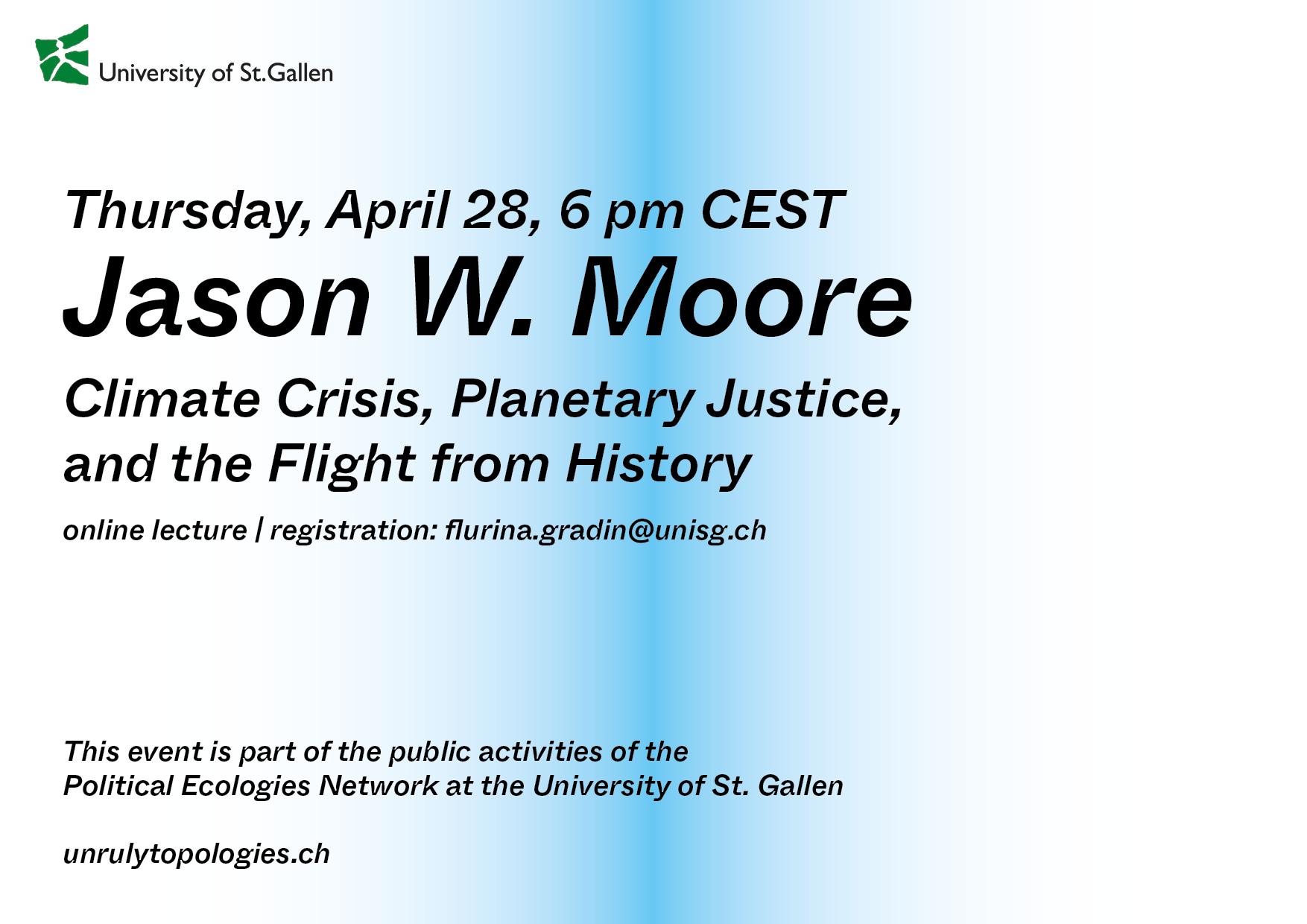
April 28, 2022, 6 pm
Online-Event
Guest Lecture with Jason W. Moore at the University of St. Gallen. Registration here.
Among the legacies of a half-century of environmental studies – across the Two Cultures – is a denial of the history of capitalism in the unfolding climate crisis. In this lecture, environmental historian Jason W. Moore explores two entangled problems in contemporary interpretations of climate crisis and climate justice. One tendency reduces the problem of Holocene climate history to Man and Nature. Rather than reconstruct the long history of class, climate, and civilizational change, we are delivered neo-Malthusian stories that are not only empirically flawed but politically disabling.
Another tendency, common across the humanities and social science, reduces the problem of capitalism to social relations abstracted from the modern history of climate and environmental change, beginning the invasions of the New World in 1492. Moore shows how today's climate crisis is rooted in the emergence of a capitalist world-ecology during the Little Ice Age, and how a politics of planetary justice that ignores that history recapitulates a "soft" climate denialism and favors an authoritarian response to the climate emergency.
Online-Event
Climate Crisis, Planetary Justice and the Flight from History
Guest Lecture with Jason W. Moore at the University of St. Gallen. Registration here.
Among the legacies of a half-century of environmental studies – across the Two Cultures – is a denial of the history of capitalism in the unfolding climate crisis. In this lecture, environmental historian Jason W. Moore explores two entangled problems in contemporary interpretations of climate crisis and climate justice. One tendency reduces the problem of Holocene climate history to Man and Nature. Rather than reconstruct the long history of class, climate, and civilizational change, we are delivered neo-Malthusian stories that are not only empirically flawed but politically disabling.
Another tendency, common across the humanities and social science, reduces the problem of capitalism to social relations abstracted from the modern history of climate and environmental change, beginning the invasions of the New World in 1492. Moore shows how today's climate crisis is rooted in the emergence of a capitalist world-ecology during the Little Ice Age, and how a politics of planetary justice that ignores that history recapitulates a "soft" climate denialism and favors an authoritarian response to the climate emergency.
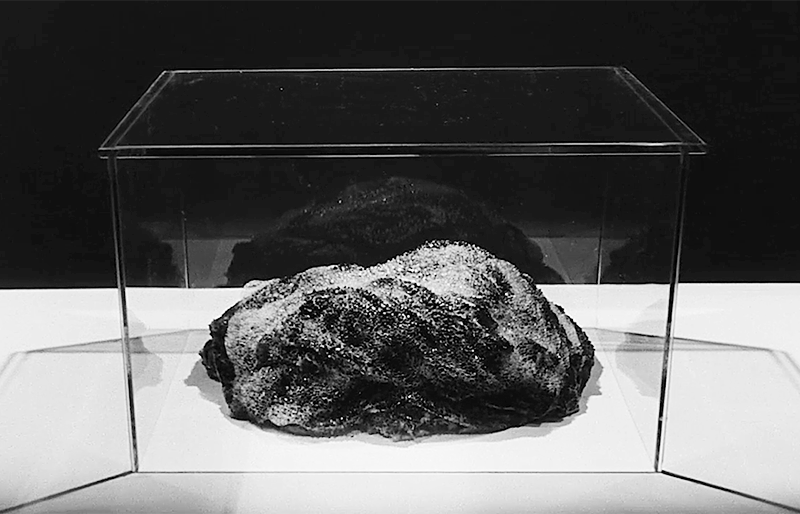
April 20, 2022, 7:30 pm
Public Film Screening and Discussion
A Terrible Goddess. Vegetal Agency and Radioactivity in Caltiki, The Immortal Monster (1959)
Albulastrasse 14 | CH-8048 Zürich
Hosted by Marco Malvestio, Marcel Rickli and Flurina Gradin.
One of the very first science fiction movies to be produced in Italy, Caltiki, il mostro immortale (1959) is an uncanny exploration in monstrosity and categorial hybridism. Directed by Riccardo Freda and Mario Bava, Caltiki is a “monster movie” pivoting on the eponymous creature, an ancient, deadly, monocellular being that is awakened by an archaeological expedition. While Freda and Bava’s film is, in many ways, just a B movie, the adoption of tropes and conventions of science fiction allows it to dramatize the unspoken horror towards the vegetal world permeating our culture.
Caltiki is also a product of the atomic age, and thus the movie dramatizes the dangers and the potential of nuclear energy, which Italy was starting to exploit at the time. Drawing on vegetal imagination and plant horror, the movie provides an example of humans’ encounter with the intrinsic monstrosity of vegetal agency, forcing the characters and the audience to deal with the vegetal world in all its uncanniness.
This project has received funding from the European Union’s Horizon 2020 research and innovation programme under the Marie Sklodowska-Curie grant agreement No 890656.
Public Film Screening and Discussion
A Terrible Goddess. Vegetal Agency and Radioactivity in Caltiki, The Immortal Monster (1959)
Albulastrasse 14 | CH-8048 Zürich
Hosted by Marco Malvestio, Marcel Rickli and Flurina Gradin.
One of the very first science fiction movies to be produced in Italy, Caltiki, il mostro immortale (1959) is an uncanny exploration in monstrosity and categorial hybridism. Directed by Riccardo Freda and Mario Bava, Caltiki is a “monster movie” pivoting on the eponymous creature, an ancient, deadly, monocellular being that is awakened by an archaeological expedition. While Freda and Bava’s film is, in many ways, just a B movie, the adoption of tropes and conventions of science fiction allows it to dramatize the unspoken horror towards the vegetal world permeating our culture.
Caltiki is also a product of the atomic age, and thus the movie dramatizes the dangers and the potential of nuclear energy, which Italy was starting to exploit at the time. Drawing on vegetal imagination and plant horror, the movie provides an example of humans’ encounter with the intrinsic monstrosity of vegetal agency, forcing the characters and the audience to deal with the vegetal world in all its uncanniness.
This project has received funding from the European Union’s Horizon 2020 research and innovation programme under the Marie Sklodowska-Curie grant agreement No 890656.
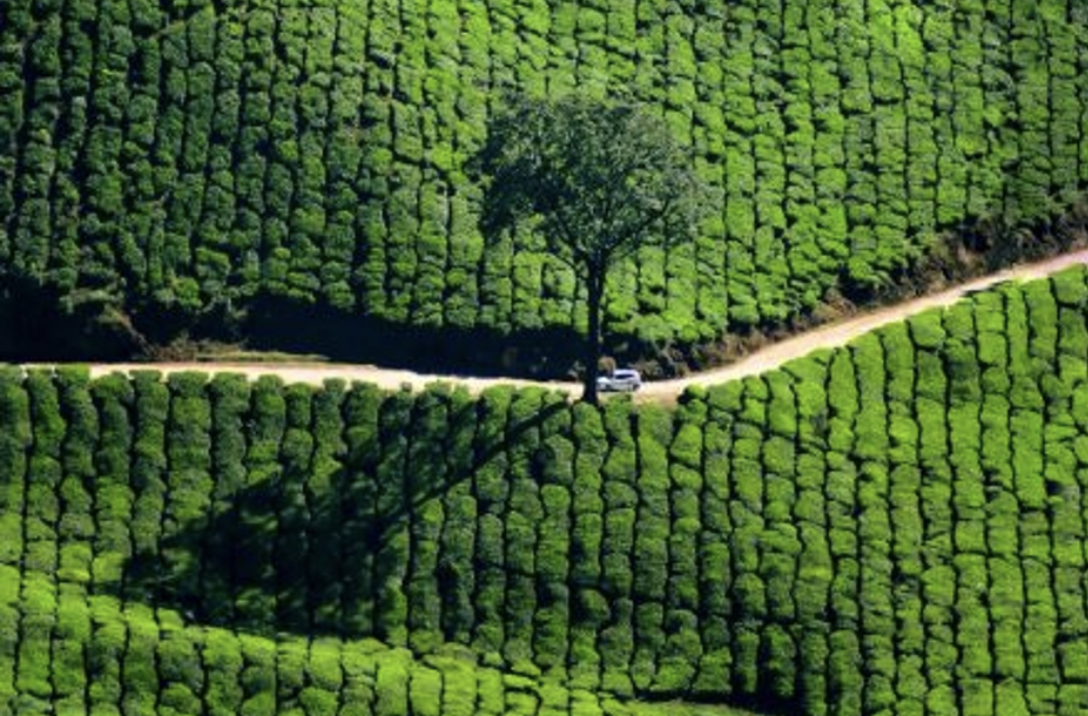
February 25, 2022, 1-3 pm
Online-Event
Earth Beings at the Commodity Frontiers
Guest lecture with Federico Luisetti at the University of Amsterdam. Registration here.
In Earth Beings: Ecologies of Practice across Andean Worlds (Duke University Press 2015), Marisol de la Cadena translates the Quechua word tirakuna, the plural of earth, as “earth-beings.” Earth-beings are for Quechua speakers other-than-human subjects that frighten and preannounce, protect and punish, deceive and heal, sharing emotions, feelings and expressions with the people (runakuna).
Caught in the commodity frontiers of the contemporary regime of capitalist accumulation, also socio-ecological entities such as melting glaciers and mutating viruses can be perceived as eccentric subjectivities. They are earth-beings that resist enclosure by the global environment and announce the alliance between counter-hegemonic politics of nature.
Online-Event
Earth Beings at the Commodity Frontiers
Guest lecture with Federico Luisetti at the University of Amsterdam. Registration here.
In Earth Beings: Ecologies of Practice across Andean Worlds (Duke University Press 2015), Marisol de la Cadena translates the Quechua word tirakuna, the plural of earth, as “earth-beings.” Earth-beings are for Quechua speakers other-than-human subjects that frighten and preannounce, protect and punish, deceive and heal, sharing emotions, feelings and expressions with the people (runakuna).
Caught in the commodity frontiers of the contemporary regime of capitalist accumulation, also socio-ecological entities such as melting glaciers and mutating viruses can be perceived as eccentric subjectivities. They are earth-beings that resist enclosure by the global environment and announce the alliance between counter-hegemonic politics of nature.
